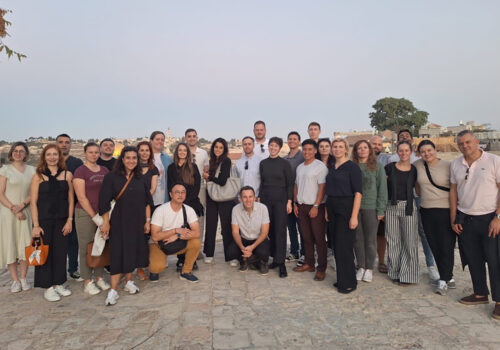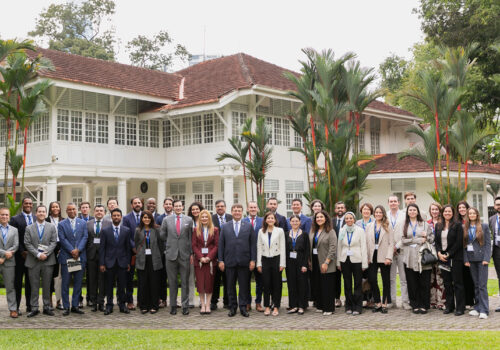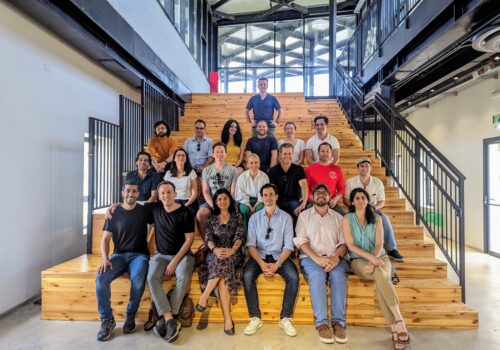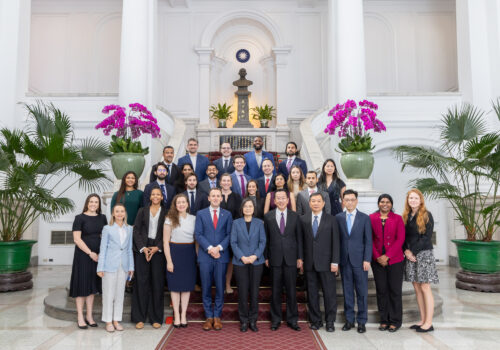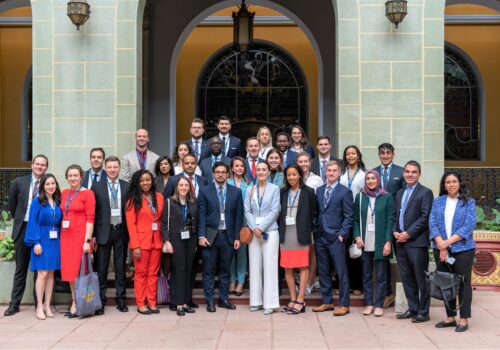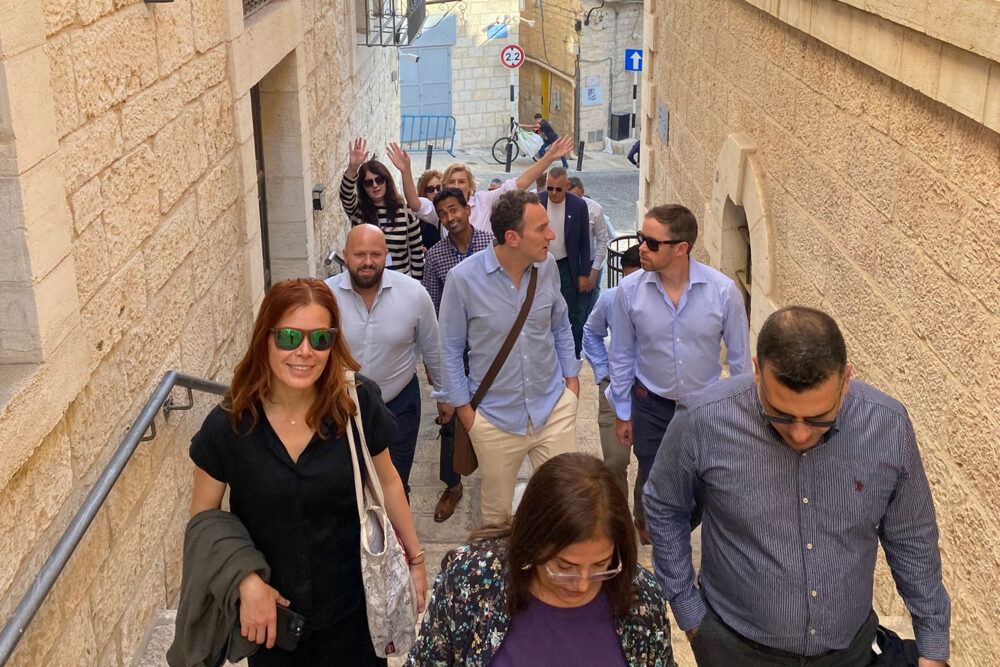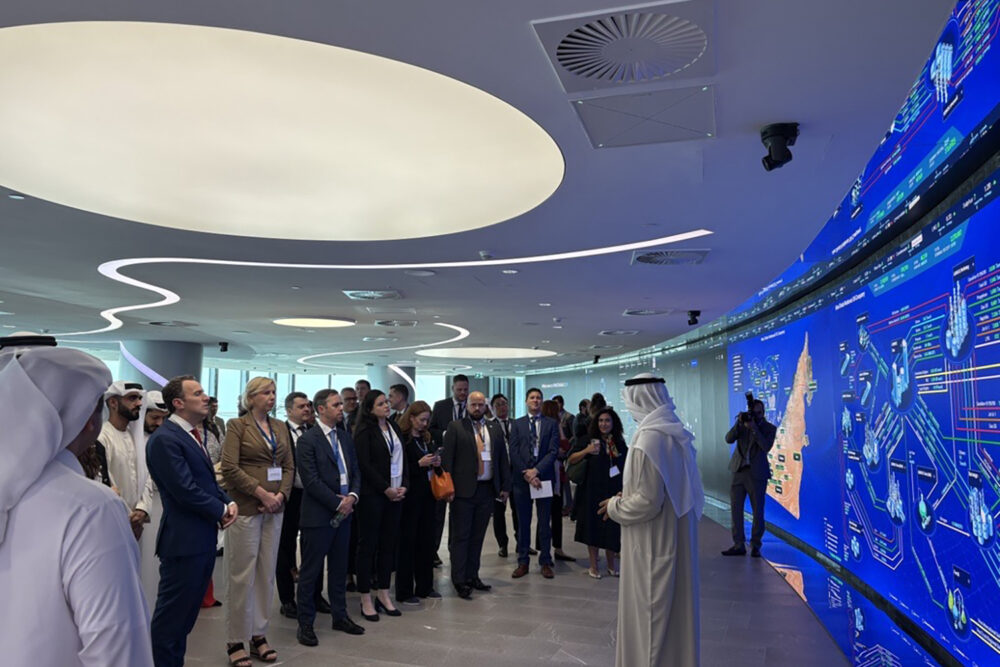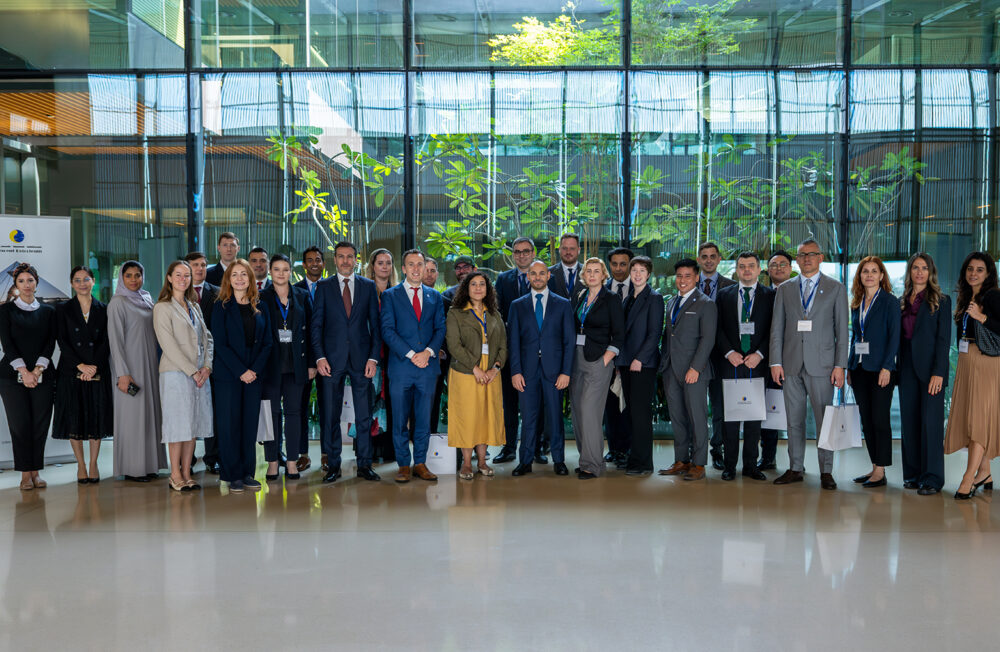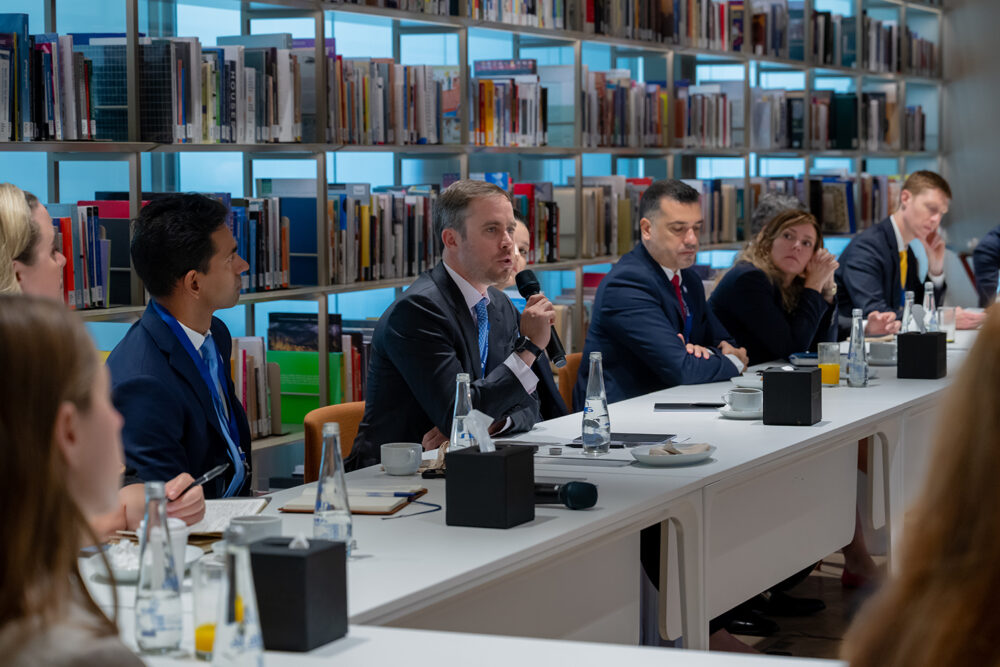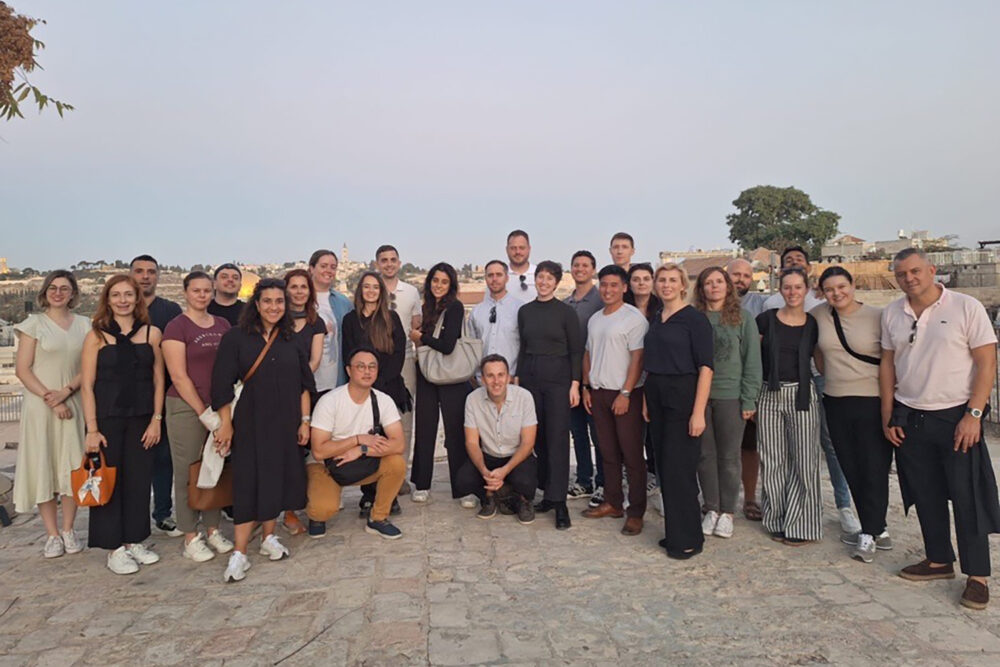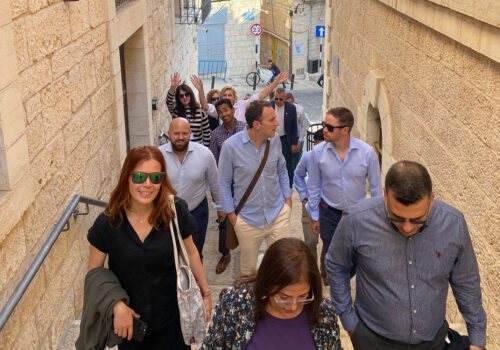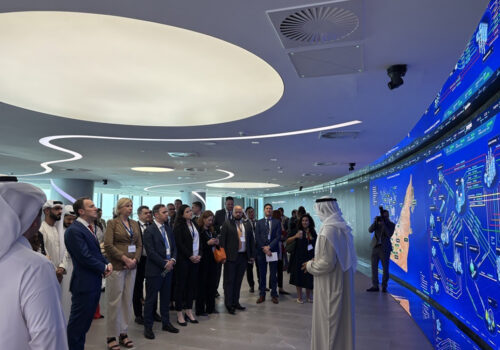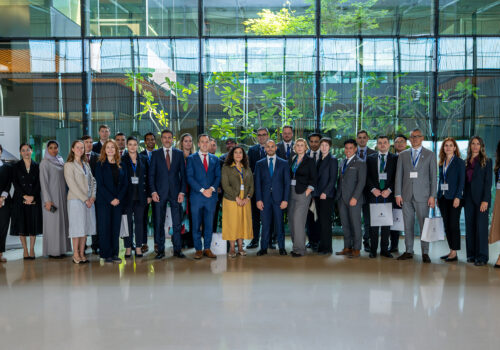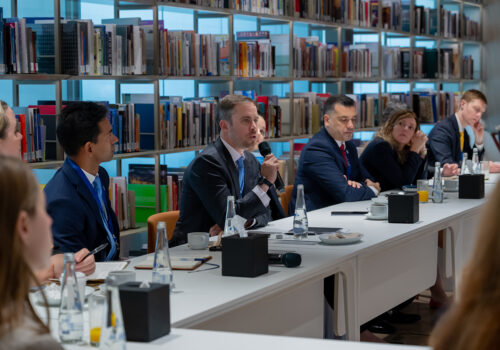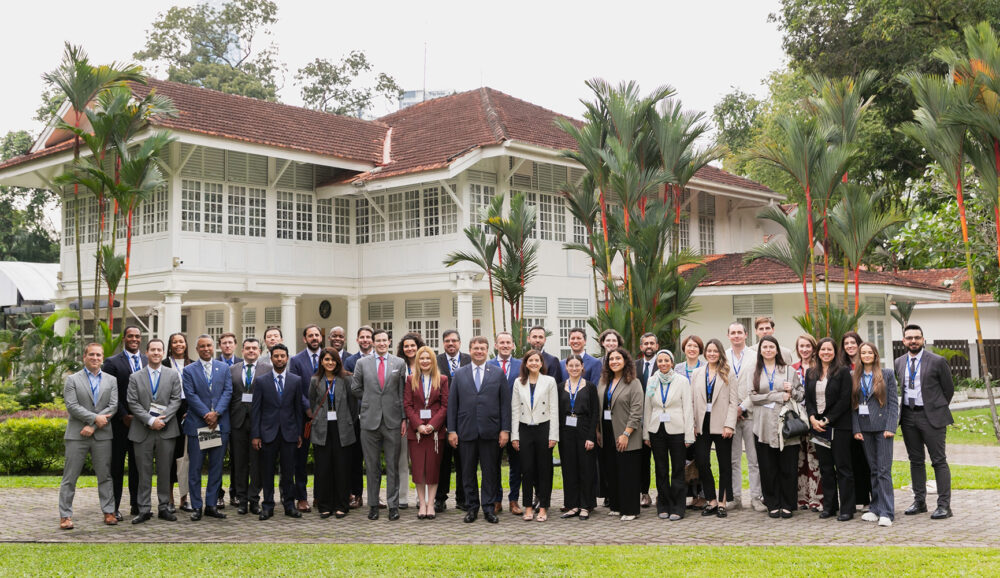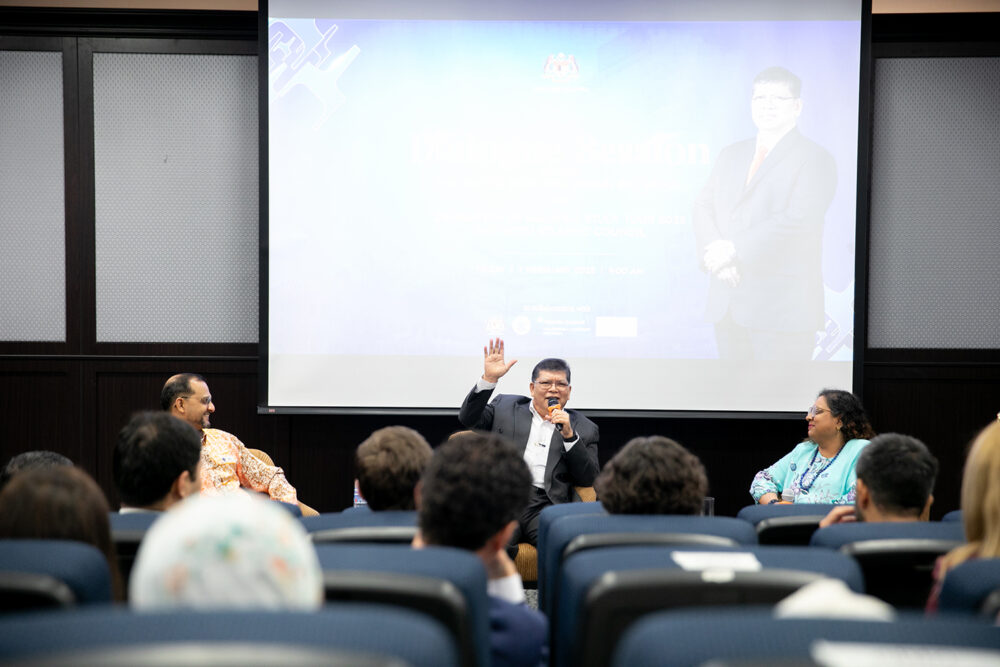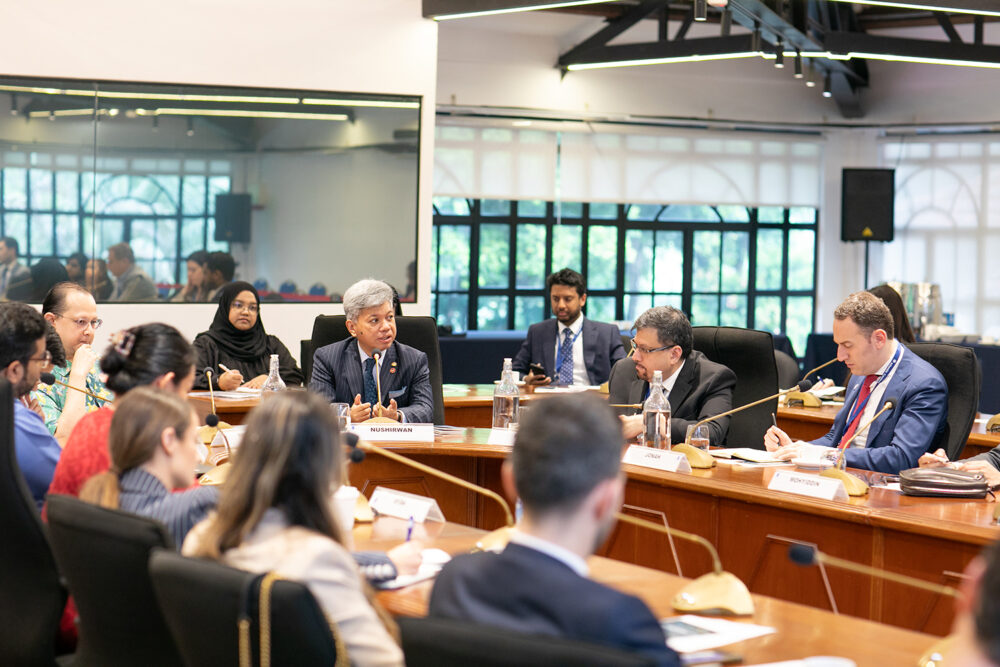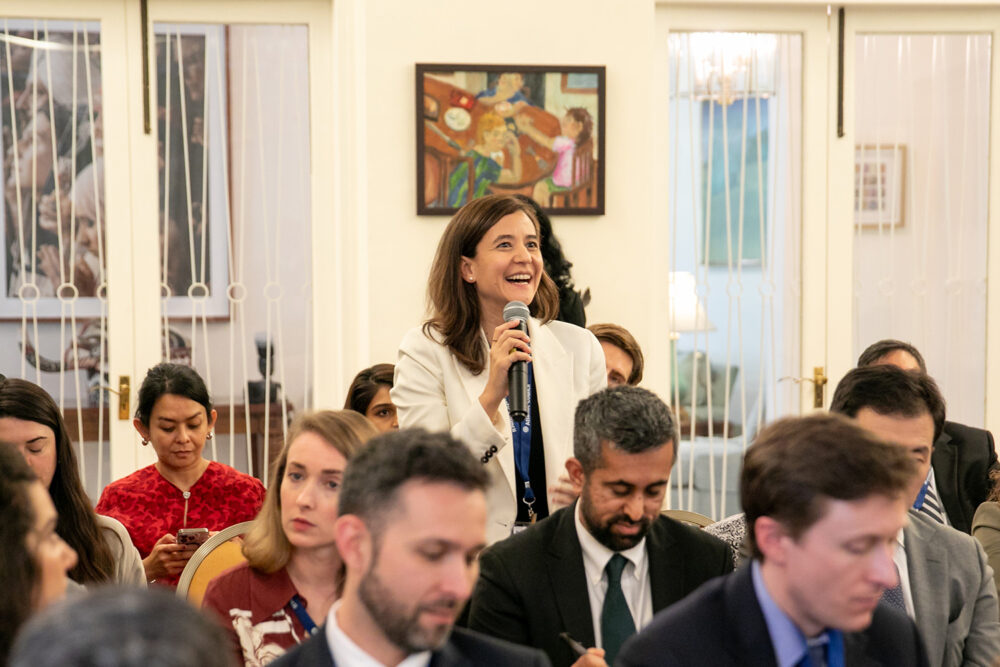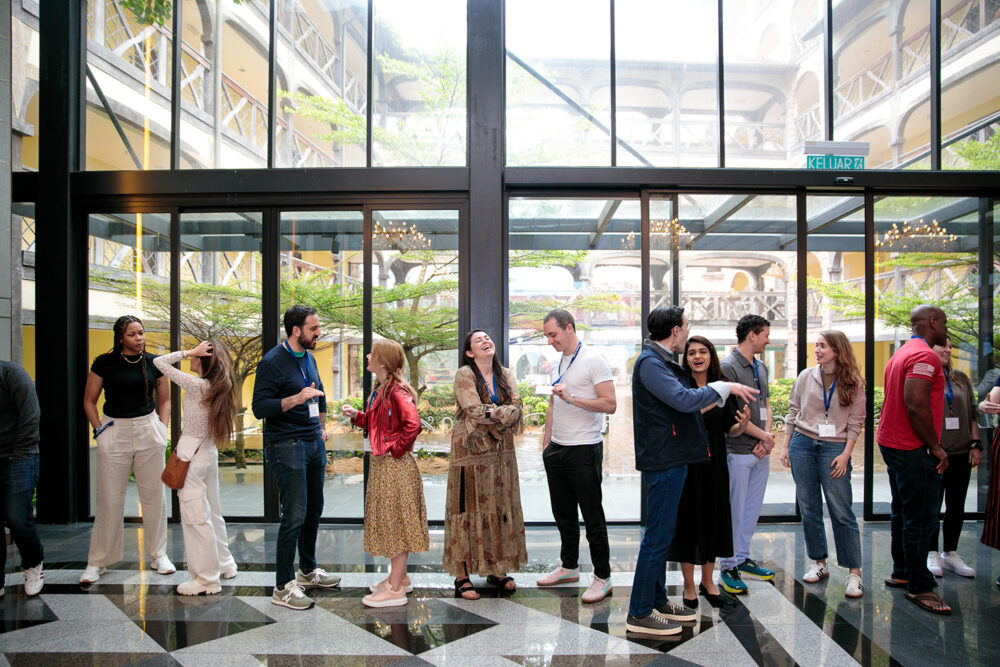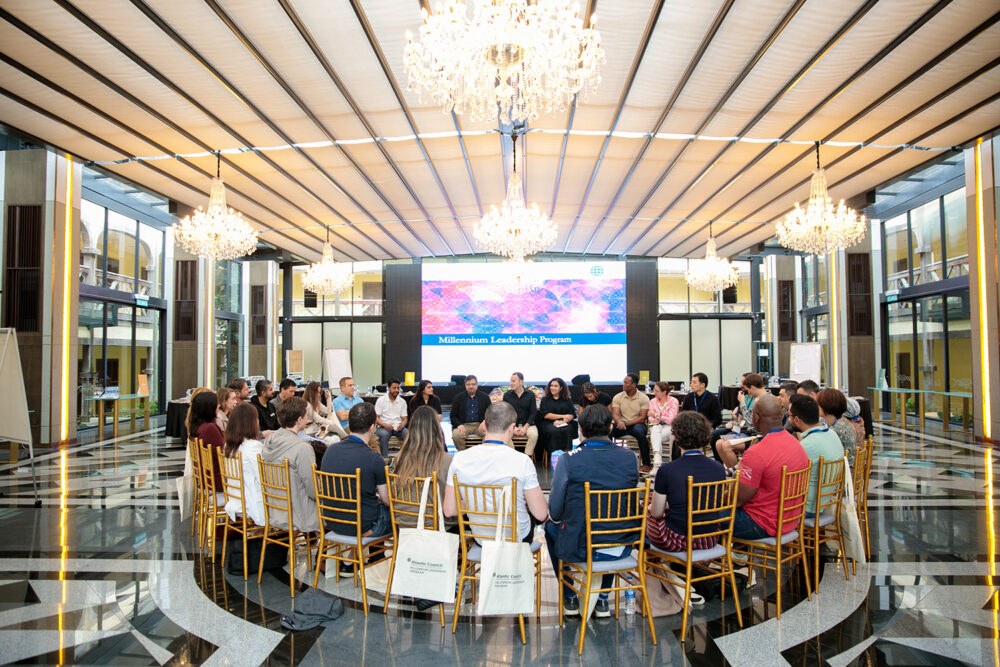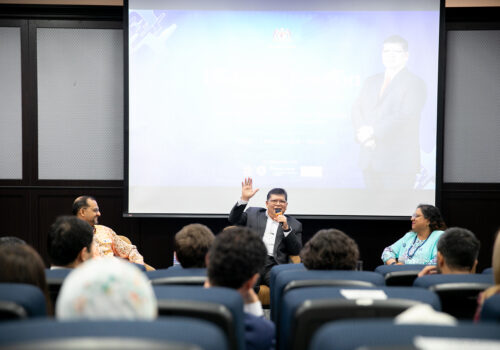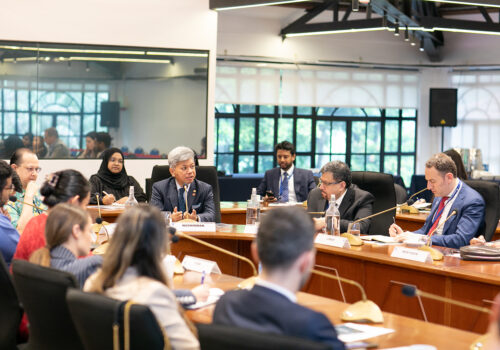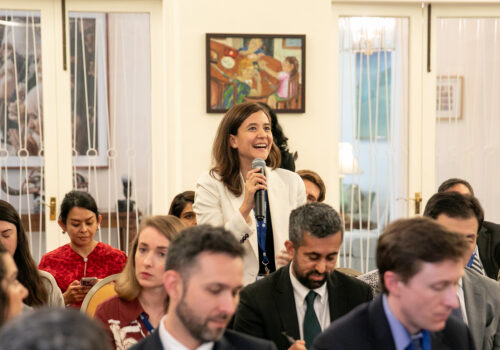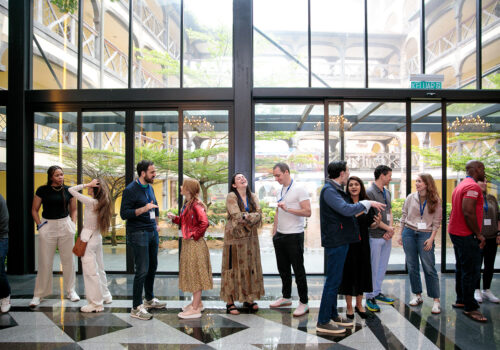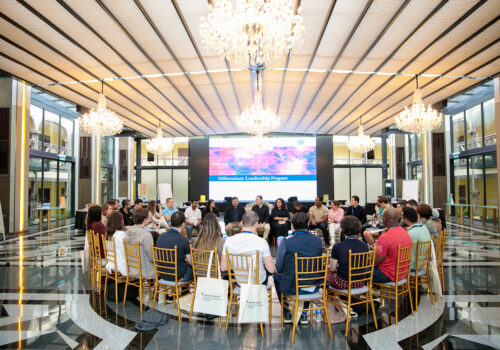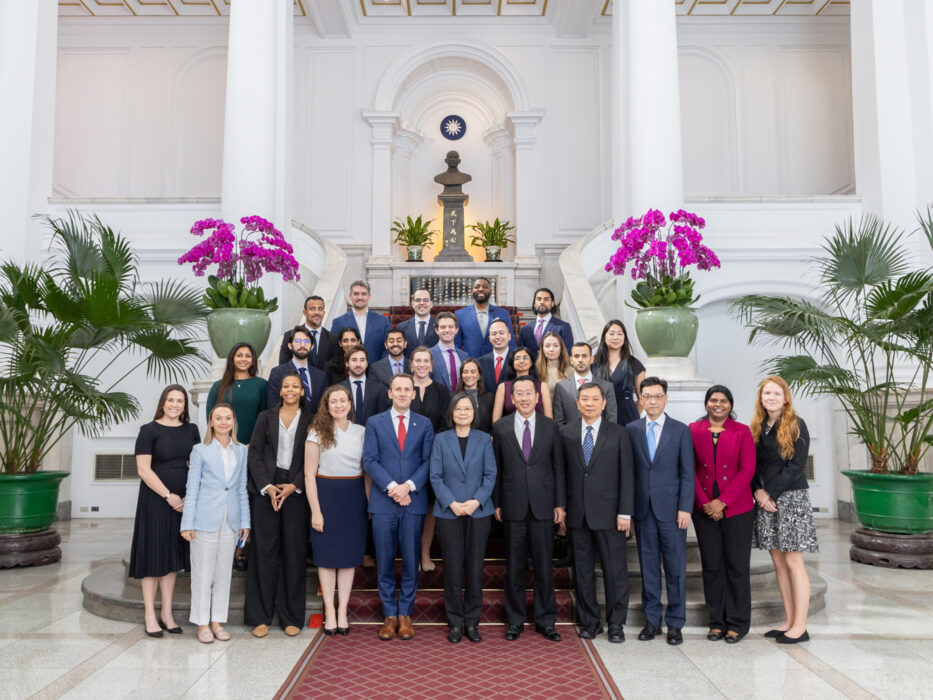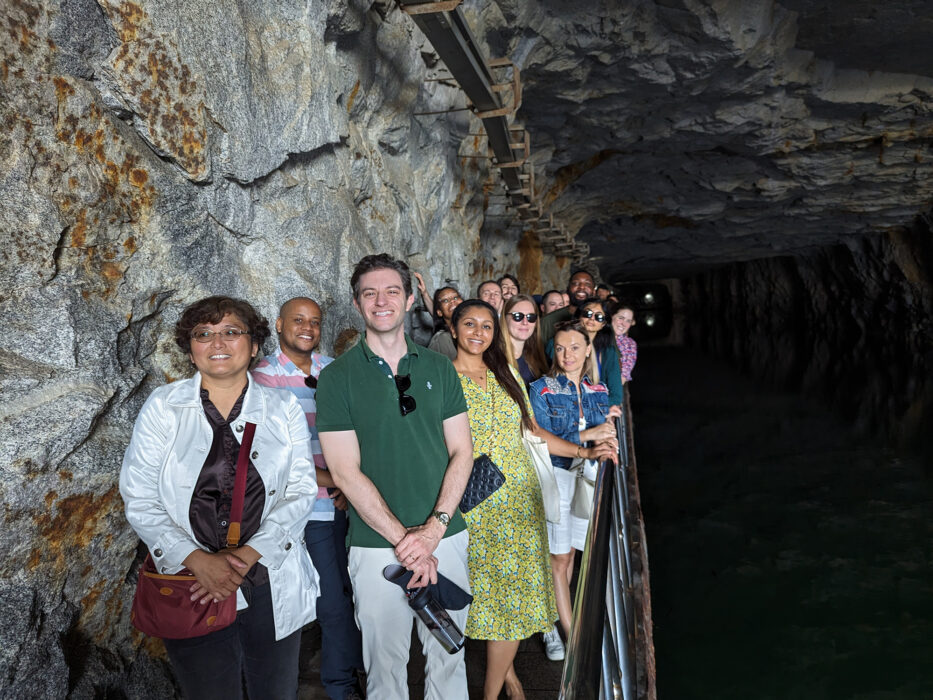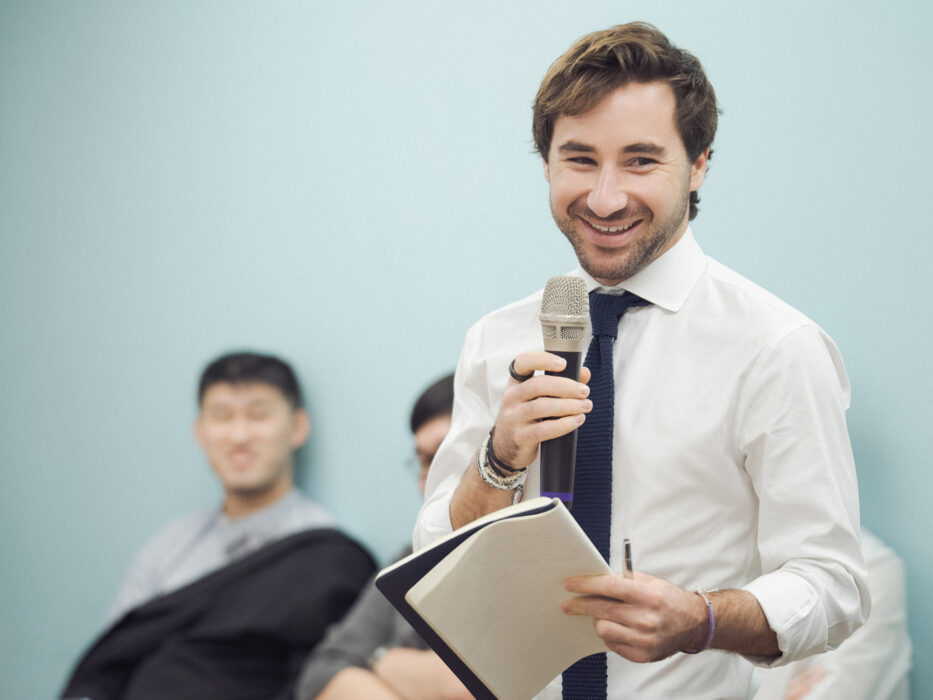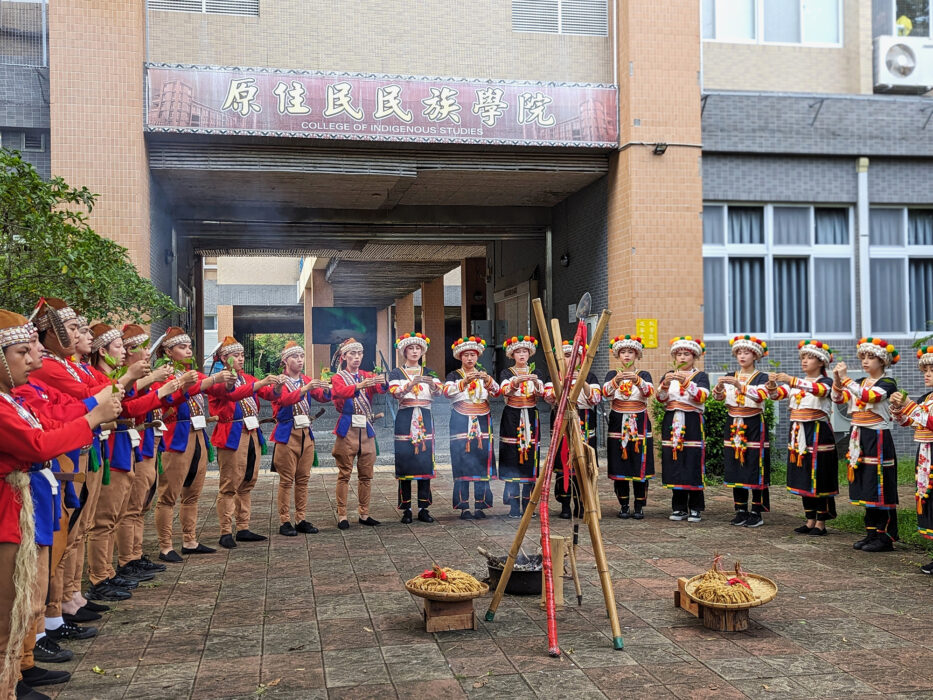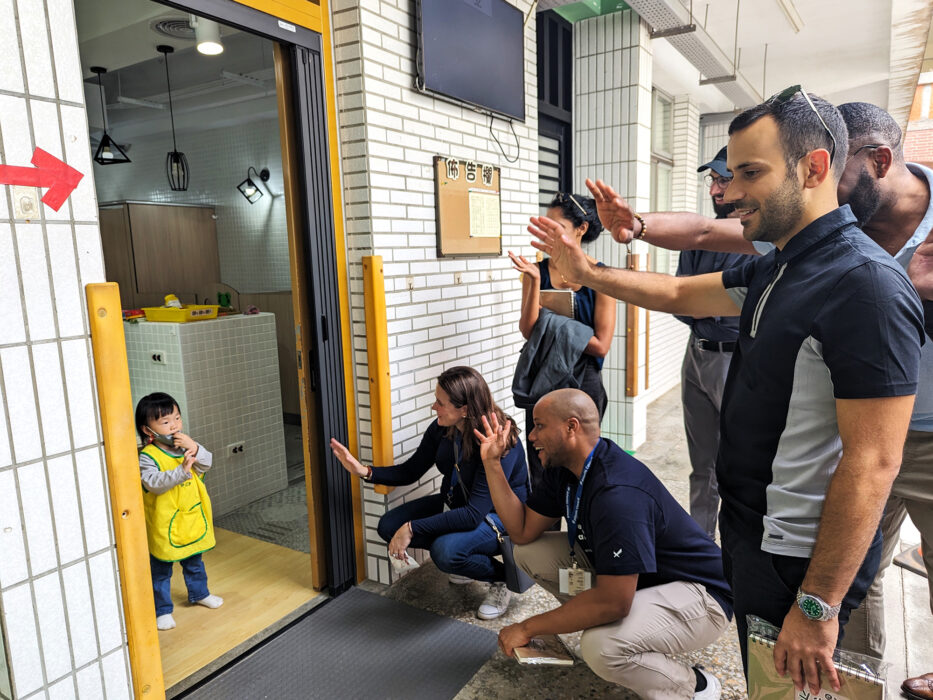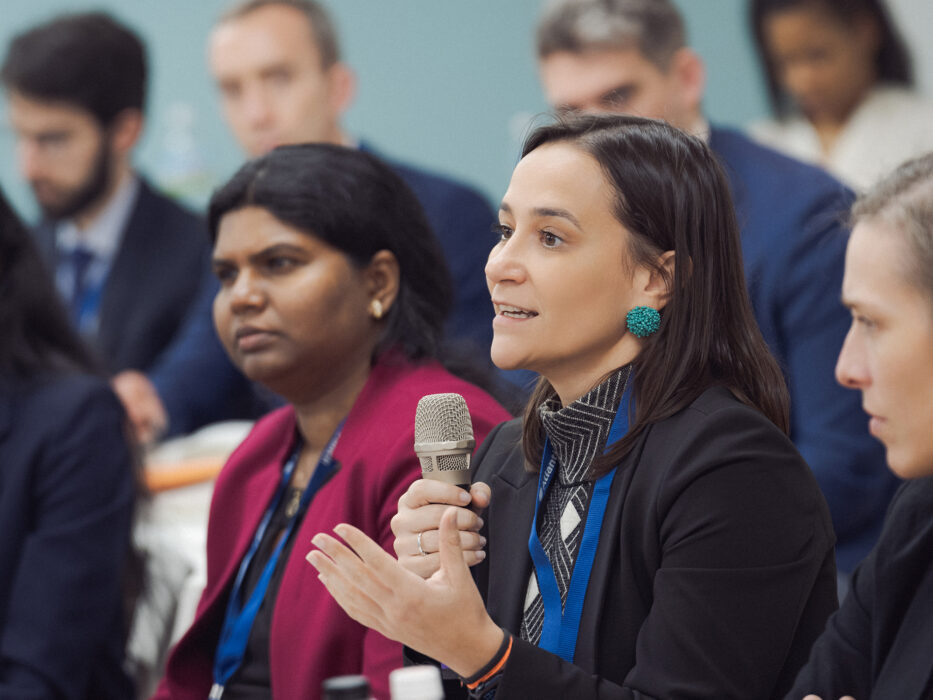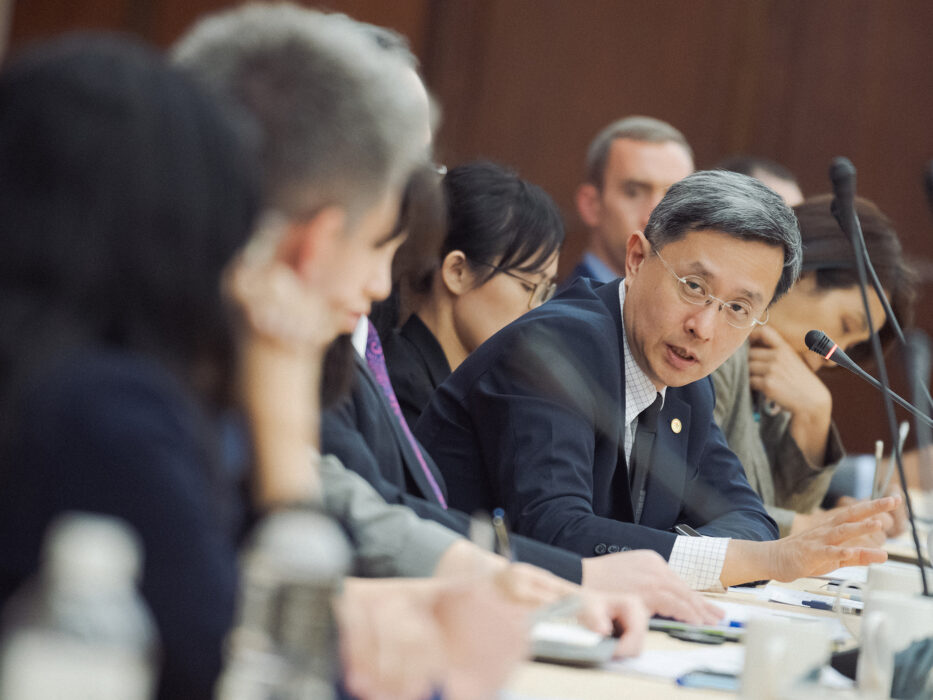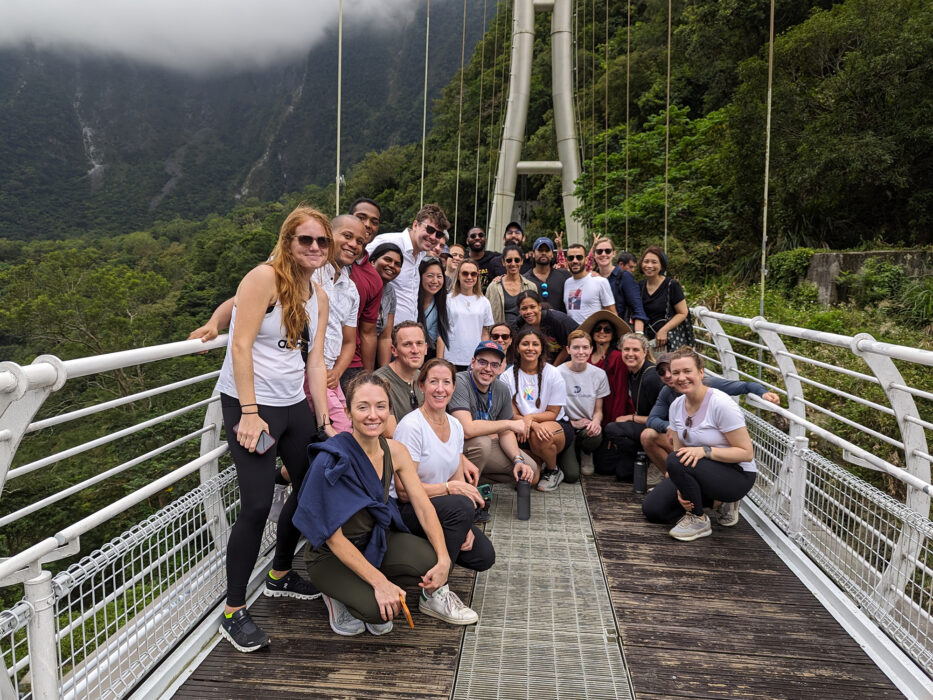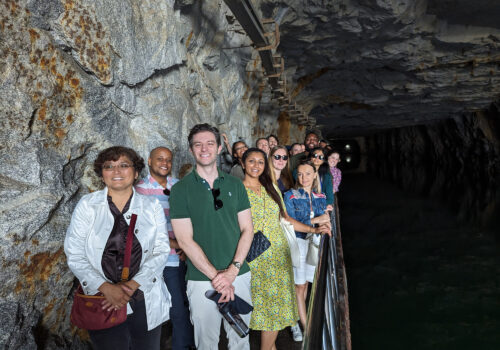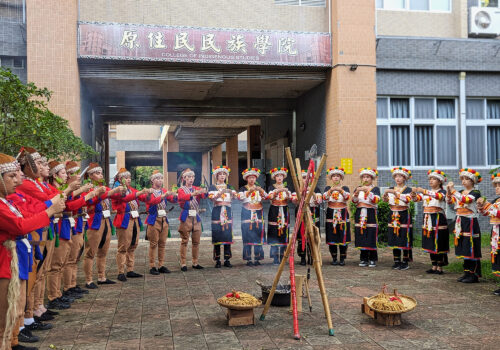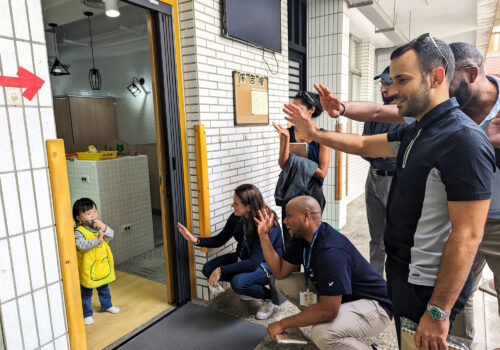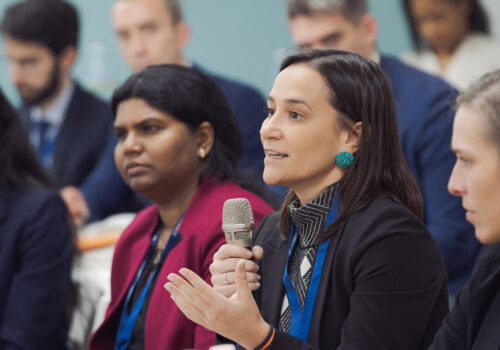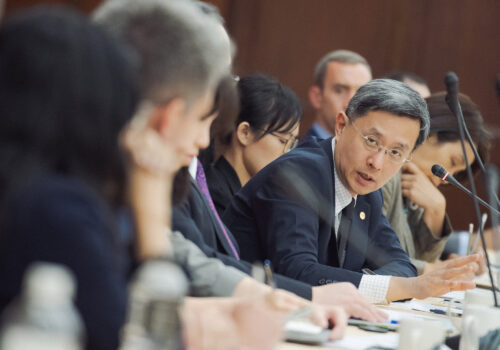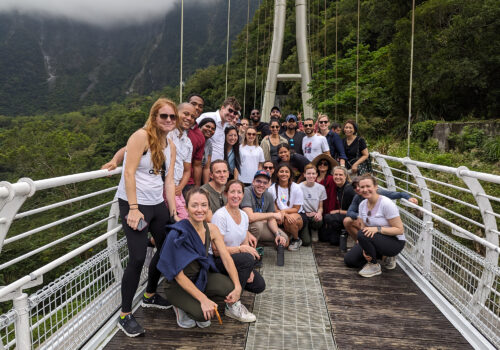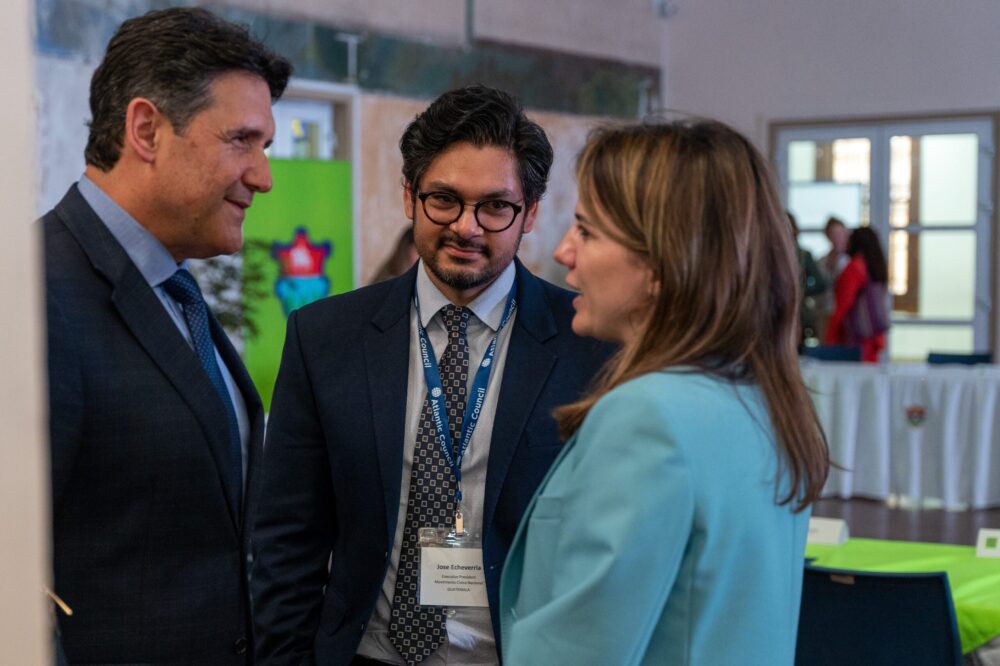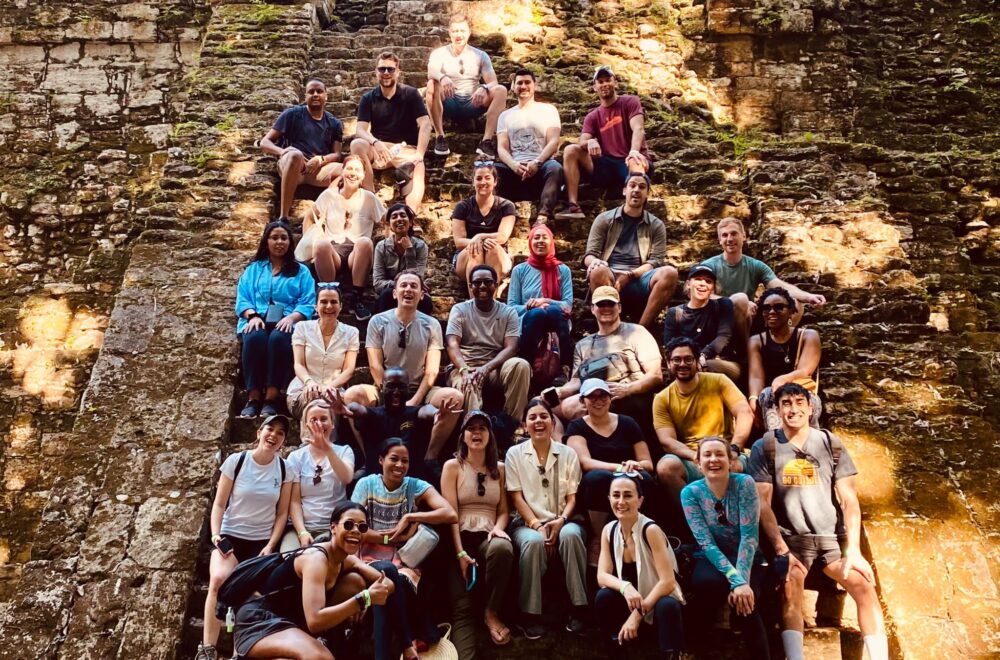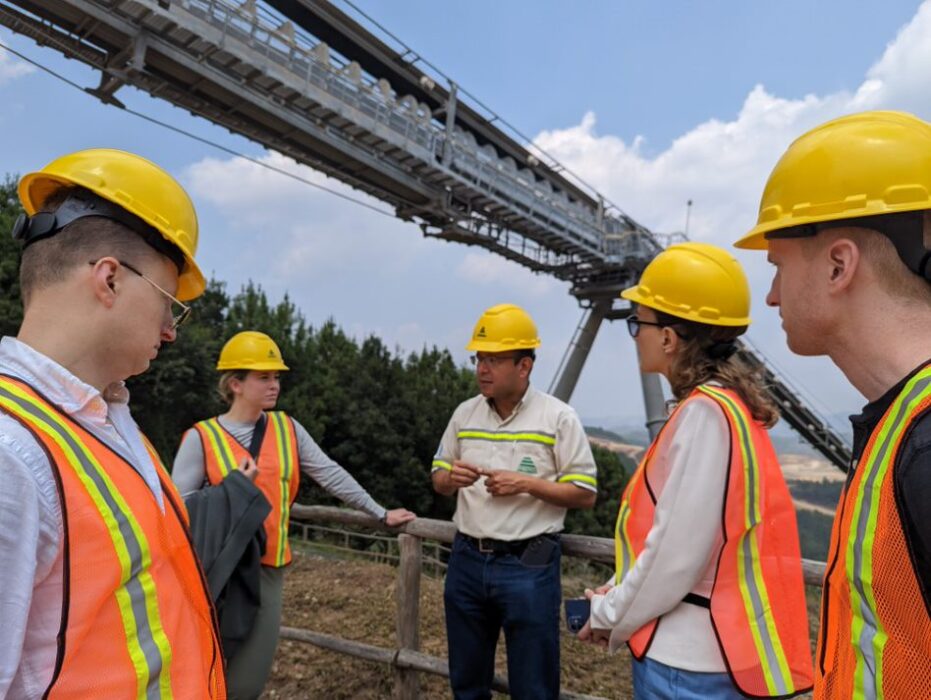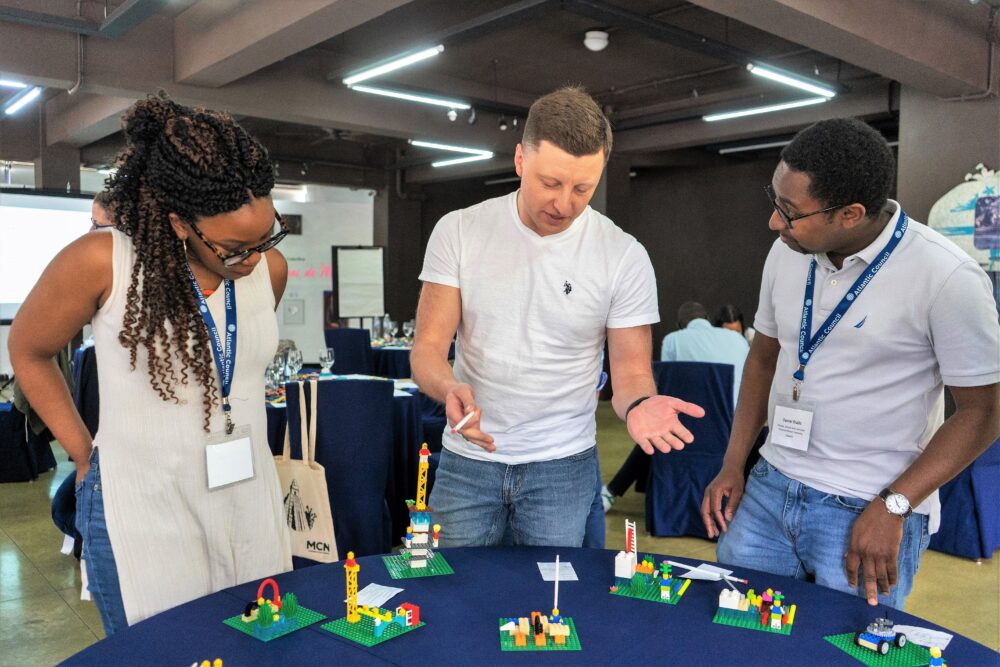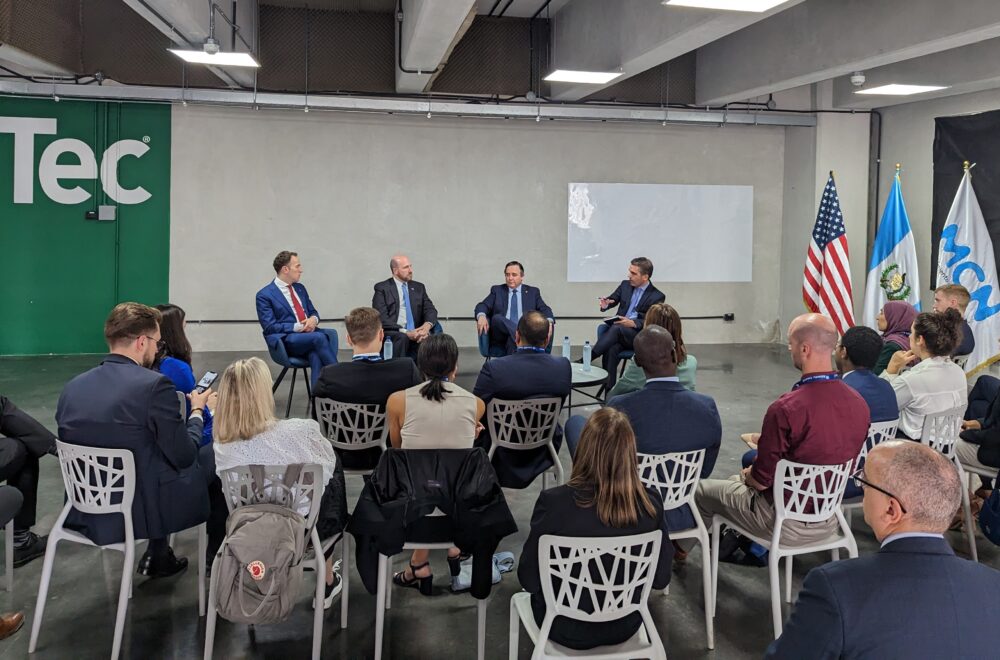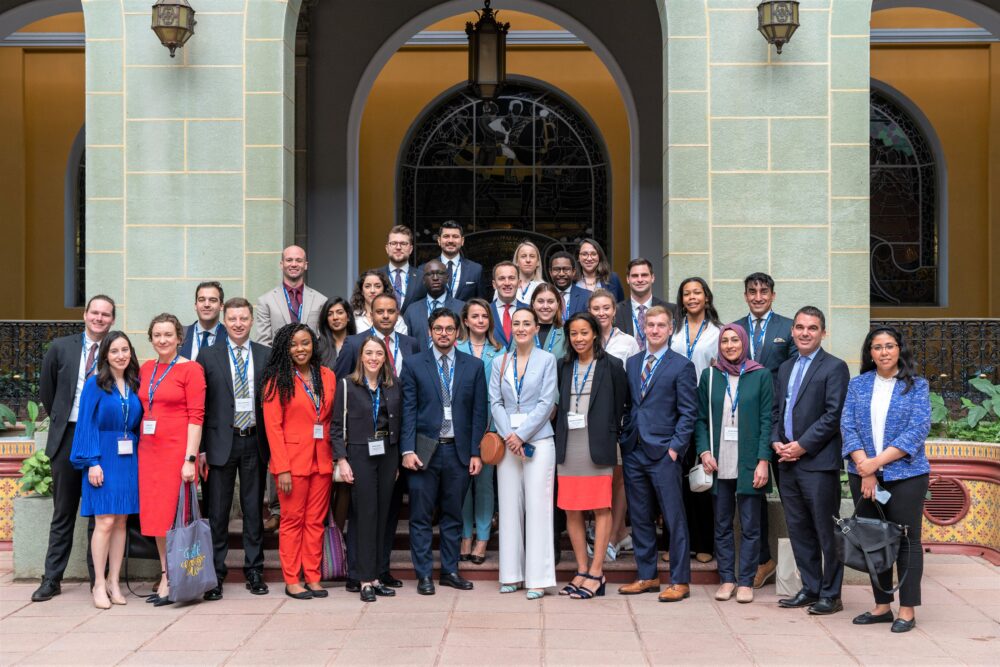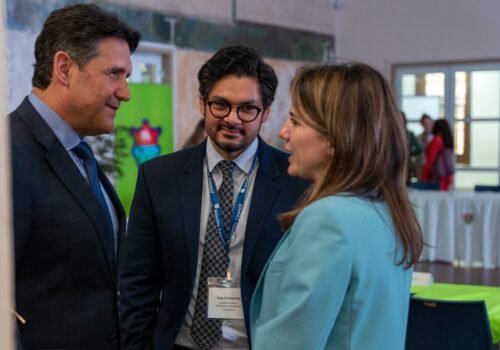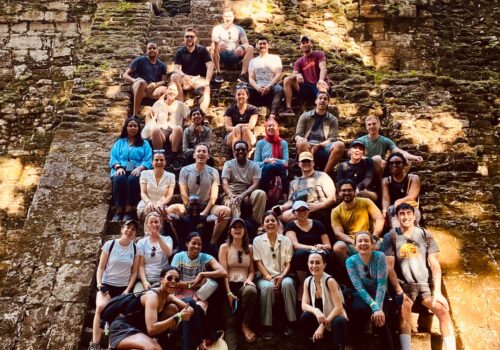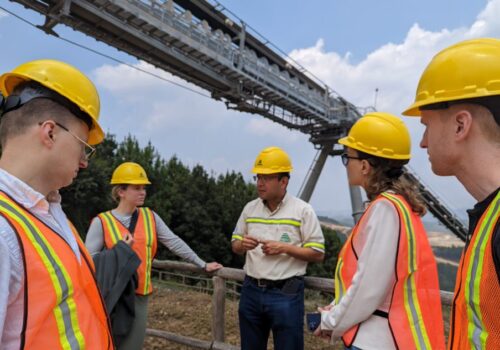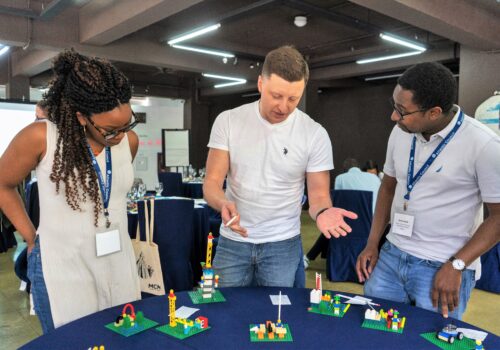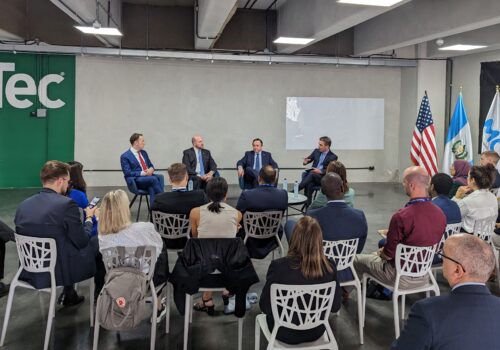Explore reflections from our trips, tours, and more
The UAE, Israel, and the Palestinian territories 2025
In today’s geopolitical landscape, few case studies capture the demands of adaptive leadership more powerfully than the Israeli–Palestinian conflict and its broader regional dynamics.
From October 27 to November 6, 2025, the Millennium Leadership Program brought a cohort of global leaders on an immersive study tour to the United Arab Emirates, Israel, and the Palestinian territories. The trip marked the second iteration of the Millennium Leadership Intensive (MLI)—a three-month hybrid program designed to deepen these professionals’ understanding of complex domestic and regional challenges while strengthening their leadership practice in the process.
Below are several participants’ key reflections from the journey, along with a note from the MLP team on why study tours remain essential for developing the leaders of tomorrow.
Jump to a participant reflection
Youth innovators in Bethlehem and what empowerment really looks like
With divisions quick to arise, leaders must be both humble and agile
The challenge of sustaining commitment in trying times
Technology and innovation have a role in building shared prosperity
In the Holy Land, a reminder of humility
Testing assumptions and forming community on the ground
Youth innovators in Bethlehem and what empowerment really looks like
During our study tour, a roundtable with young innovators in Bethlehem offered a clear lesson about what youth empowerment looks like in action, beyond government policy and programs. There was no formal stage or presentations, just a group of young people explaining what they were building and why. One innovator talked about a project to revitalize Bethlehem’s cultural heritage and identity, another recounted starting a community initiative after noticing a need on her street, and a third shared how he was working to provide high-quality health care to his local community. These stories were simple, but they were also direct examples of young people taking responsibility for problems they have lived and experienced in front of them.
As the conversation went on, I found myself paying attention to how they worked. What struck me was how clearly they understood empowerment as something they did, not something they waited for. Empowerment was something they already possessed. It showed up in the way they approached problem solving, shared networks, strengthened, and supported one another’s ideas. None of them were waiting to be asked to lead; they were already doing the work.
Hearing them took me back to youth I’ve worked with in other communities around the world: young leaders who stepped in without waiting for permission or recognition. I’ve seen that same spark before, and it struck me again in Bethlehem. Real leadership often begins quietly, in small communities, with young people who act because they believe they should.
I left Bethlehem reminded that the next generation isn’t preparing to lead someday; they’re already leading now. And it made me recognize that part of my own responsibility as a leader is knowing when to step back and trust younger voices to shape what comes next.
—Kristina Kempkey is a 2025 Millennium Leadership Intensive participant and a former senior advisor with the US Agency for International Development.
With divisions quick to arise, leaders must be both humble and agile
During our study tour, we spoke with Tel Aviv-Yafo Deputy Mayor Chen Arieli, who walked us through her playbook for creating change when stakeholders may be in agreement on the direction, yet divided on key details.
Arieli—who is also an activist focused on social justice, welfare, and public health—told us how, when she entered public service, she needed to learn new ways to engage stakeholders in her role as a municipality leader. This reminded me that leading change requires more than just working through issues with those ideologically opposed to your vision. It also means building clarity, alignment, and momentum with those closer to you in aspiration.
Other leadership lessons arose during our discussion. For example, our conversation highlighted how important it is as a leader to connect your actions back to the community you serve, ensuring that any decision is driven not by ego but by the best interests of the people (and not just those supporting you). It also underscored the value of meeting in person with those who disagree with or publicly criticize you the most—and not to take their criticism personally, although any sensitivity to the criticism is something not to be shamed, as it shows you care. Our talks also reiterated the importance of relentlessly seeking out partners, which helps highlight what you have in common and each stakeholder’s strategic advantage. Finally, the conversation offered a reminder to do the math on compromise and understand that progress, which often requires negotiation, is better than trying to win every battle.
The reality is that divisions can quickly emerge between groups of people, even those who in theory should be in easy alignment. Addressing these divides will require humility, compassion, and bravery to ensure progress and lasting change is made.
—Mandeep Jangi is a 2025 Millennium Leadership Intensive participant and former managing director at the US Agency for International Development.
The challenge of sustaining commitment in trying times
We arrived in the region at a sensitive time, just two weeks after Israeli hostages were released. The issue influenced the mood of almost every meeting we attended. Conversations in the region rarely happen without layers of history, politics, and uncertainty sitting just beneath the surface, and this trip was no exception.
In Abu Dhabi, our discussions at the Ministry of Foreign Affairs and the Mubadala Investment Company offered a clearer sense of how the United Arab Emirates (UAE) is trying to navigate this complexity. At the ministry, officials spoke openly about the pressures and criticism they faced after signing the Abraham Accords. What struck me was how they described the decision, not as a bold bet they are now defending, but rather as an ongoing calculation. They articulated the risks, but also the cost of stepping back from engagement, which in their view would close off long-term possibilities. One official phrased it almost quietly but with conviction: “We’re not here to be a bank. We want to build.” That line captured the shift they are trying to make.
At Mubadala, this idea took on a practical dimension. Its focus was on moving the UAE beyond the identity of a country that finances growth elsewhere to one that generates its own innovations. Even amid heightened regional tensions, conversations there were less about reaction and more about direction, on how to keep building an economy grounded in ideas, talent, and partnerships rather than relying solely on capital.
Later, in our meeting at the Knesset, Israeli lawmakers reflected on the situation with a mixture of gratitude and pragmatism. They recognized the UAE’s willingness to sustain engagement through difficult moments, though several noted it was also pursuing deeper ties with other partners. It underscored how fluid the region remains; relationships adapt quickly, and alignment is rarely stable for long.
Across all the conversations, what stood out was the ability of these leaders to stay engaged even when the path is unclear, to keep recalibrating rather than retreating, and to maintain a forward orientation in a part of the world where unpredictability is the norm. It reminded me that much of leadership, especially in environments like this, is about navigating that tension, of addressing the complexity without letting it stall progress.
—Mika Abdullaeva is a 2025 Millennium Leadership Intensive participant and a senior advisor at the US Department of State’s Office to Monitor and Combat Trafficking in Persons.
Technology and innovation have a role in building shared prosperity
In Tel Aviv, we met a panel of technology policy experts at Startup Nation Central, who provided us with an outlook on the Israeli innovation ecosystem. Technology accounts for 20 percent of Israel’s gross domestic product and 53 percent of its annual exports, fueled by seven thousand startups and mature companies, over one thousand active venture capital funds, and a unique ecosystem—all of which are reasons Israel has been called “startup nation.” In Israel, the combination of startup founders (who share a global mindset, a risk-taking appetite, and resilience), vested employees, and venture-capital funding power not only impacts the country’s economy but also its partners.
Since the events of October 7, 2023, tech employees and founders alike have had to engage in mandatory duties with the Israel Defense Forces, and therefore there was a need to accelerate outsourcing partnerships in other countries. For example, the Startup Nation Central team engaged with Morocco’s Polytechnic University to foster the country’s talent pool and increase collaboration with Israeli tech companies. More importantly, the bilateral teams identified critical events, such as climate change, that affect Morocco’s agricultural economy (15 percent of the country’s gross domestic product), intending for Israel, which has developed innovations in hydro, to provide leadership in supporting families and businesses strongly affected.
From these discussions about Israel’s innovation ecosystem and its challenges, Israel’s business culture and pace stood out. While tech teams there are agile and move fast, business leaders in the region appear to take more time to build relationships and a trust bridge before committing to fundraising campaigns and partnerships.
But, ultimately, our conversations on the ground in Israel showed that tech leadership can help move nations forward together and strengthen regional collaboration.
—Oana Sirbu is a 2025 Millennium Leadership Intensive participant and the chief executive officer at Properful.
In the Holy Land, a reminder of humility
During our trip to Israel and the West Bank, our most compelling meetings were with those who do not hold state authority. We heard from Theophilos III, the patriarch of the Orthodox Church of Jerusalem, who underlined the importance of religious institutions in this volatile region because they guard a fragile peace across centuries. He recalled how in 637 or 638, Patriarch Sophronius placed the keys of Jerusalem in the hands of Caliph Umar, securing the right of many faiths to continue their worship. At the Church of the Nativity, we witnessed the All Saints’ Day mass celebrated by Pierbattista Pizzaballa, the Latin patriarch of Jerusalem, who stressed the importance of communities crossing borders and working together.
During our trip, we met modern torchbearers of these traditions. In Jaffa, we met Ihab and Ora Balha, a Muslim-Jewish couple who run a school for children of multiple faiths. In Bethlehem, George Al-A’ma, a steward of the city’s Center for Cultural Heritage Preservation, introduced us to young leaders shaping the region through arts, culture, and finance. In Dubai, we sat for lunch with Ahmed Al Mansoori, who has transformed his personal collection of priceless artifacts into the Crossroads of Civilizations Museum, spreading the word of tolerance through historical proof of peaceful coexistence.
Cardinal Pizzaballa said during the November 1 Mass, “Be careful, without ever falling into the temptation of seeking results. We may not see the fruits of what we are sowing.” Leadership in the Holy Land is not born from a thirst for ambition and is not measured in fleeting displays of power. Rather, lasting change comes from informal leaders across religious, civic, and cultural roles who seek to sow the seeds of faith, dignity, and compassion. They provide hope for peace across the centuries.
—Aron Rimanyi is a 2025 Millennium Leadership Intensive participant and an associate at Training the Street.
Testing assumptions and forming community on the ground
MLP study tours are meant to serve as a laboratory for learning but also as an incubator for personal and leadership development. While no trip can capture the full spectrum of perspectives embedded in a relationship as complex as that between Israelis and Palestinians, MLP brought together a broad range of competing perspectives so participants could form their own judgments, grounded in the lived realities of people experiencing the conflict every day. Our job was to shed light, not heat, on a region that already holds tension.
Starting in Abu Dhabi and Dubai, the cohort garnered a sense of the United Arab Emirates’ posture in today’s geopolitical environment through engagements with government officials, industry titans, and cultural sites such as the Abrahamic Family House. Equipped with a broader regional perspective, the group then spent the next week traveling across Jerusalem, Bethlehem, Ramallah, and Tel Aviv. Participants met with members of both the Knesset and Palestinian Authority, the mayor of Bethlehem and the deputy mayor of Tel Aviv, Israeli tech experts and young Palestinian entrepreneurs, and countless other civil society leaders. The aim was to expose participants to reality as it is, however diverse it is, and maybe hold up a mirror to the participants’ own realities while doing so.
Pulled from their daily contexts and echo-chambers of opinion, the cohort dove headfirst into discomfort as they navigated the political, religious, and cultural dimensions of such a devastating and complex conflict. This experiment flexed the muscle of listening—a necessary component of any leader’s disposition, but something that can be so hard to come by in today’s landscape of partisan division.
In the group’s closing reflections, the phrase “strong views held lightly” resonated with many. To them, it did not mean you cannot stand firmly in your beliefs (in fact, the phrase implores one to hold “strong” views, not passive ones), but that you should also be able to expand your perspective to incorporate multiple truths at once. One participant told me, “seeing checkpoints, hearing from bereaved families on both sides, and speaking with political leaders all in the same forty-eight hours forced me to test my assumptions and sharpen a mediation mindset.”
The cohort hailed from seventeen different countries, from Turkey to Poland to the United States, and included elected officials, business leaders, and civil society practitioners. Not only did conversation among a diverse community of professionals sharpen the quality and intellectual rigor of the debates held, but it also set the foundation for lifelong relationships. That is a testimony to the power of in-person convening—and to the value of finding communities that can relate to one’s successes and failures across cultures and sectors.
—Jonah Fisher is the senior director of the Millennium Leadership Program at the Atlantic Council. Camilla Reitherman is a program assistant for the Millennium Leadership Program.
Malaysia 2025
This year, Malaysia takes the chairmanship of the Association of Southeast Asian Nations (ASEAN)—and many will be watching to see how the country navigates issues from economic growth to sustainability to great-power competition in the region.
To glean lessons about tackling these issues, the Atlantic Council’s 2024 Millennium fellows journeyed to Malaysia, in a trip financially supported by Unitas Communications, in February. There, they met with leaders from across the public and private sectors to learn more about strategies to address the challenges that arise in today’s uncertain geopolitical environment.
Below are our fellows’ reflections from the trip.
Jump to a fellow reflection
Escaping the “middle-income trap”
The US cannot afford to be absent in Malaysia—or the region
What’s required for global leadership
A blueprint for global sustainability
A bridge for the East and West
Partner perspective: The world needs leaders who can navigate complexity
Escaping the “middle-income trap”
Malaysia stands at a crucial crossroads in its economic development, with a nominal gross domestic product (GDP) per capita of around fourteen thousand dollars. The nation is determined to escape the “middle-income trap” by transitioning from being a low-cost producer to a high-cost producer, a thread we heard during many meetings during the visit.
During our visit to MBSB Bank, a panel discussion highlighted Malaysia’s potential. A line by one of the panelists (Jasmine Begum, who is regional director of legal, corporate, and government affairs at Microsoft) stayed with me: Investors now need to focus on not just cost but also geoeconomics—and Southeast Asia can be a key beneficiary. This helped to stress Malaysia’s unique position to benefit from the artificial-intelligence (AI) economy and today’s multipolar geopolitical environment.
Over decades, Malaysia has solidified itself as a key link in the global semiconductor supply chain. Today, semiconductors provide a crucial input for many different industries and innovations, including the rapidly growing AI economy. Semiconductors represent 25 percent of Malaysia’s GDP and Malaysia accounts for 13 percent of global semiconductor assembly, testing, and packaging. Previously, Malaysia’s “selling point” for attracting semiconductor activity was its cheap labor upon which companies could build different technology stacks; however, the recipe for continued gains in the GDP per capita involves many other ingredients.
Many of these ingredients appear to be found in Malaysia: A high percentage of graduates in science, technology, engineering, and math; supportive government policies; a central location in Southeast Asia; and geopolitical neutrality (particularly between the United States and China). I was struck by how there was a common vision presented by the public and private sector for the future of Malaysia’s economy.
Of course, challenges exist. Such challenges include combating brain drain, moving up the technology value chain, balancing the ever-growing demand for power with affordability and sustainability, and the tenuous balance of having good economic relationships with the United States and China (especially involving cutting-edge technology). Recent multibillion-dollar investments from major US and Chinese technology companies indicate that, at least for now, Malaysia is very much on the right path.
—Gabriela D. Santos is a 2024 Millennium fellow and is a managing director and the chief market strategist for the Americas at J.P. Morgan Asset Management
The US cannot afford to be absent in Malaysia—or the region
On a balmy Friday afternoon in February, our cohort arrived at the official residence of the US ambassador to Malaysia for a briefing.
Surrounded by works from Malaysian and American artists, we learned about the origins of the Malaysian-US friendship, which began on Malaysia’s Independence Day in 1957 and continues to grow. Malaysian and US troops today train side by side, working together to combat international crime and stop the flow of illicit narcotics. Young Malaysian leaders work with their US counterparts through people-to-people programs such as the Young Southeast Asian Leaders Initiative to improve their communities. And Malaysian and US businesses are close partners in critical industries, such as the semiconductor and auto parts industries. In fact, when the contagious Delta COVID-19 variant swept through Malaysia in the spring of 2021, it wasn’t only Malaysian chip factories that halted operations—six factories owned by US manufacturer General Motors temporarily suspended operations due to parts shortages.
Coordination between both nations will only become more important this year as Malaysia chairs ASEAN, the grouping that, when treated as a single unit, is the world’s fifth-largest economy. Under Malaysia’s leadership, the bloc will confront key issues: disputes in the South China Sea, conflict in Myanmar, supply chains for critical industries, energy connectivity, and more. Any issue, incorrectly addressed, can destabilize peace and security in the region for years to come—and affect industries both countries, and the world, depend on.
Our meeting made three realities clear: US and Malaysian interests are deeply intertwined. What happens in this region will shape the future of the world. And if US leaders want to shape that future in a way that furthers their national interests, while also promoting peace and stability in the region, this is the moment to get more involved, not less.
—Jasneet (Jas) Hora is a 2024 Millennium fellow. He was the deputy director of speechwriting for former US Vice President Kamala Harris.
What’s required for global leadership
Our visit to the Malaysian Parliament revealed a nation finding its global voice through strategic governance and economic diversity.
During our visit, we spoke with Speaker Johari Abdul, who emphasized Parliament’s role in ensuring governmental checks and balances. We heard about how Parliament has become more dynamic and transparent in an effort to strengthen Malaysia’s democracy.
Our visit also highlighted how Malaysia is working to improve its economic diversity, supported by the Shared Prosperity Vision 2030 and its thriving manufacturing, tourism, and digital sectors. From our visit, it was clear that Malaysia’s multiculturalism fuels innovation and positions it as a unique bridge between Eastern and Western economies.
The visit provided five lessons for leaders on the global stage:
- Leverage diversity as a strength: Malaysia’s multicultural makeup fosters resilience and adaptability in a world with an ever-changing structure of governance and economic order
- Balance tradition with innovation: Maintaining constitutional frameworks (and foundations) while embracing modern governance approaches creates stability during transformation.
- Practice transparent leadership: Transparency builds institutional trust.
- Cultivate strategic positioning: Malaysia’s rise shows how geographic and cultural positioning can be leveraged for regional influence and raising one’s voice on a global stage
- Foster cross-partisan solutions: Cross-party cooperation on national priorities demonstrates leadership focused on solutions.
Over the next five years, Malaysia may serve as a case study on how Southeast Asian nations can emerge on the global stage while maintaining social cohesion and economic resilience.
—Kurt Davis Jr. is a 2024 Millennium fellow and senior director with Alvarez & Marsal’s Debt Advisory team.
A blueprint for global sustainability
During our visit to Malaysia, our cohort visited Sarawak Energy, a Sarawak state-owned utility company. According to the company, it is the only energy producer in ASEAN generating over 75 percent of its electricity from renewable sources. We heard about the company’s approach to renewable energy, carbon capture, and conservation, which offered critical lessons for my home country of Zimbabwe—and beyond.
Hearing about Sarawak Energy’s vision and operations made me think about how economic growth and climate responsibility can coexist. That lesson is particularly relevant for Africa’s energy transition, in which balancing industrialization with sustainability remains a key challenge.
Like Sarawak, many African nations struggle with energy security, deforestation, and waste and byproduct management. While visiting Sarawak Energy, we heard about the company’s carbon capture project that it launched in 2023 in collaboration with the Sarawak Biodiversity Council and Japanese biotechnology company CHITOSE Group. The project uses microalgae to capture carbon dioxide and convert it into biofuels, industrial materials, and agricultural products, showing how byproducts (for example, from energy production) can be transformed into economic opportunity. Implementing similar circular economy principles in Africa could help reduce emissions while creating sustainable industries.
Our stop in Sarawak also highlighted how top-down policies alone are insufficient—real change requires grassroots engagement. Sarawak’s tree-planting initiatives, marine conservation efforts, and enforcement against illegal trade highlight how local communities must be at the forefront of sustainability efforts. This aligns with Africa’s need for community-driven conservation efforts to combat deforestation and biodiversity loss.
Sarawak’s efforts underscore that leadership must be collaborative, adaptive, and rooted in long-term vision. The partnerships between Sarawak Energy, CHITOSE, and conservation organizations demonstrate how solving global challenges requires cooperation across industries, governments, and communities. As I return home, I feel reinvigorated in my commitment to scaling sustainable solutions, building cross-sector partnerships, and fostering a leadership model that prioritizes impact over power.
—Tatiana Sharpe is a 2024 Millennium fellow and the founder and chief executive officer of Global Impact Network.
A bridge for the East and West
Being Malaysian, I was honored to share my country with the other fellows on the study tour.
Malaysia currently occupies a strategic geopolitical position in the world. It was impressed upon us that the country is positioned as a hub for the increasingly multipolar world, through which other nations can communicate and converge. While Malaysia has had a long history with the United States, it also shares a unique relationship with China, and it therefore has to navigate a reality in which the country balances relations with both global superpowers.
The interconnectedness of Malaysia adds to this advantage of being such a hub, already contributing to the global supply chain of semiconductors. Moving forward, the goal is for the country to be an essential part of this supply chain more broadly in the field of technology.
As the world undergoes a rapidly changing global order, these sessions have underscored to me the importance of committing to the international rules-based order. This is increasingly challenging given growing protectionist tendencies globally. But during the study tour, the leaders we spoke with—at institutions ranging from Khazanah Nasional to the Institute of Strategic and International Studies—each echoed that this commitment is not only possible but necessary.
It is my hope that Malaysia can be a bridge where East meets West, both physically and digitally, and ultimately pave the way for collaboration and diplomacy in a fractured world.
—Tricia Yeoh is a 2024 Millennium fellow and associate professor of practice at the University of Nottingham Malaysia’s School of Politics and International Relations. She was formerly the chief executive officer of the Institute for Democracy and Economic Affairs (IDEAS) Malaysia.
Partner perspective
As one of the earliest alumni of the Millennium fellowship, I know the value of engaging directly with policymakers, business leaders, and civil society. So I was honored to sponsor, on behalf of Unitas Global Advisory, this year’s study tour in Malaysia, a country I’ve come to know well through my consulting work with its public- and private-sector leaders.
Traveling through Pahang, Kuala Lumpur, and Sarawak, fellows saw first-hand how Malaysia approaches regional diplomacy, economic growth, and sustainability—and partners with the United Kingdom, the United States, and others in sectors ranging from high-tech manufacturing and semiconductors to sustainable palm oil and clean energy.
Each encounter challenged assumptions, sparked critical discussions, and provided insights into how decisions at the highest levels affect communities on the ground.
Now more than ever, the world needs leaders who can navigate complexity, think strategically, and build bridges where others see divides. Influence alone is not enough—real leadership requires listening, learning, and connecting diverse perspectives.
—Muddassar Ahmed is an alumnus and partner of the Millennium Leadership Program and is the founder of and a managing partner at Unitas Global Advisory.
Israel and the Palestinian territories 2024
As challenges evolve around the world—from Ukraine to Gaza—leaders must learn from each other’s successes and failures.
With that in mind, the Atlantic Council’s Millennium Leadership Program assembled an Executive Leadership Intensive that offers global leaders the opportunity to connect across sectors and acquire tools to help drive meaningful change. As part of the experience, participants traveled to Israel and the West Bank to meet with political, economic, and civil society leaders and learn more about leadership approaches that they can apply to real-world scenarios.
Below are the participants’ takeaways from the trip, touching upon everything from the importance of resilience to the need for leaders to be adaptive.
Jump to a participant reflection
Fostering resilience is mission critical
In order for leaders to balance priorities and speak hard truths, they must build trust over time
A leader must know who to call upon
How to—and not to—handle leadership challenges
Fostering resilience is mission critical
While traveling through Israel, our group heard repeatedly about the resilience of the people.
Resilience is not innate, as highlighted during two meetings our group attended. Rather, resilience requires a deliberate, proactive focus on institutional strengthening and wellbeing, both for individual actors and broader society.
At FinTech startup Melio, we participants heard from business leaders juggling business needs with national security realities. With a significant proportion of their workforce either impacted by the attacks or called up to/affected by Israel Defense Force service, the company’s Tel Aviv-based leadership needed to reimagine its business practices to provide flexibility for team members while still meeting customer and partner needs. The meeting highlighted the utility of fostering a culture that values adaptation and support.
Our group’s visit to the International Resilience Center in Sderot likewise emphasized the need for organizations to deliberately address the impacts of both chronic stressors and acute shocks to a society’s wellbeing. The center’s focus on providing practical approaches to crisis preparedness, response, and recovery provides community leaders and institutions—as well as ordinary citizens—tools to protect their emotional well-being. Meeting with the center made clear that leaders and communities can learn from the past to protect and enhance their strength moving forward.
Taken together, these organizations offer lessons on how, through focused and intentional practice, leaders can transcend individual circumstances to strengthen the collective, not only enabling a robust crisis response but also paving the way for a more successful future.
—Brendan Johannsen is a participant in the 2024 Executive Leadership Intensive and a managing director with Teneo Risk.
In order for leaders to balance priorities and speak hard truths, they must build trust over time
All leaders face the recurring challenge of how to manage their constituents’ urgent needs without ignoring ones that may not be so immediate but will have critical implications if left unaddressed. Nowhere is that struggle more striking than Tel Aviv.
Amid Israel’s security challenges, the cost of living in Tel Aviv remains among the highest in the world. The city is responding by building a much-needed light rail transit system and additional housing to serve a rapidly expanding population. These are important projects—but they are also expensive and labor-intensive.
Our group met with Deputy Mayor of Tel Aviv Asaf Zamir, who discussed how he plans to build the Tel Aviv of tomorrow while the Tel Aviv of today faces security threats.
From our meeting, it became clear that domestic and international collaboration is important—and indeed, a force multiplier. In addition, continuous innovation in all its forms—including intellectual innovation, provided by a new generation of leaders with new solutions—is needed.
Our group also met with US Ambassador to Israel Jack Lew. We Executive Leadership Intensive participants had questions about the state of the US-Israel relationship, as US President Joe Biden had threatened, soon before the meeting, to withhold shipments of weapons if Israel launched a ground invasion of Rafah.
Meeting with Lew made me think about how leaders must convey hard truths and pick the paths they most wholeheartedly believe in, even if such a path is hard to walk—and even if the path is not a popular one. To do so, leaders must have credibility, which is hard-earned; and trust (from constituents and counterparts alike) must be built over time.
—Michael J. Goldfarb is a participant in the 2024 Executive Leadership Intensive and is the chief of staff at CAB Payments.
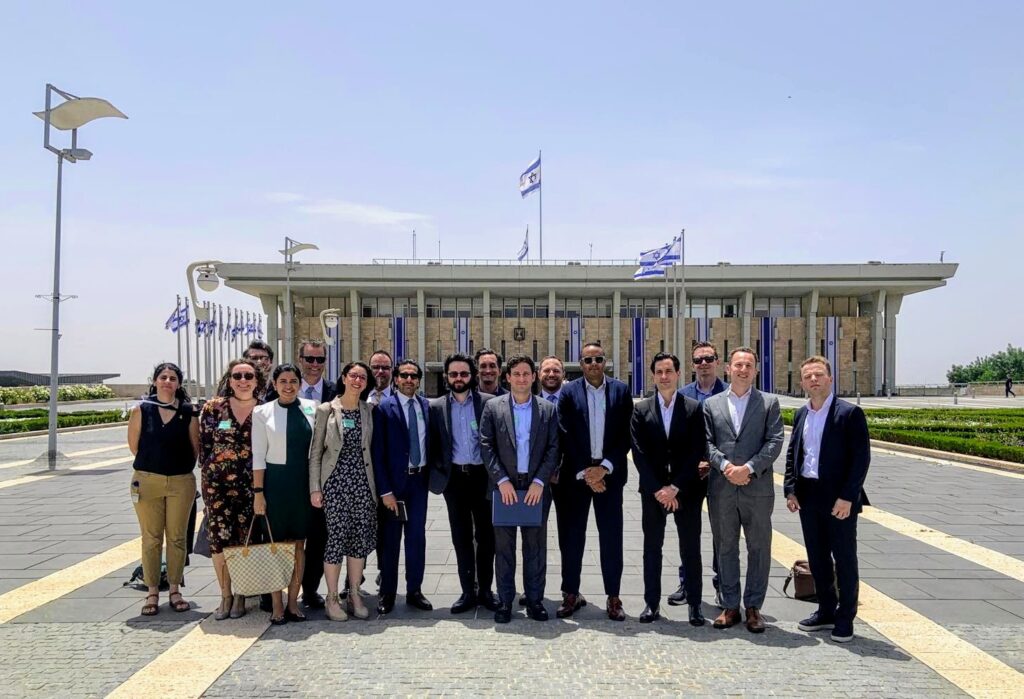
Leadership must be adaptive
Our group met with representatives from the Hostage and Missing Families Forum and Brothers and Sisters in Arms to draw insights on how they reacted to moments of crisis. Both volunteer organizations responded to the crisis in less than forty-eight hours after Hamas’s terrorist attack on Israel on October 7 with a clear objective of supporting the impacted individuals. The Forum explained to us how it provided support to the families and engaged with local, regional, and global institutions in an effort to bring the hostages back home to their loved ones. Brothers in Arms told us about how it equipped Israeli security forces with much-needed essentials and expedited hostage identification using artificial intelligence.
These organizations, led by technocrats and ex-officials, swiftly mobilized people to respond to the quickly changing challenge with no intent of filling the government’s role. Instead, these organizations focused on filling the gap that was created by slowness in the Israeli government’s response and on directly impacted stakeholders, working to understand their concerns and identify innovative solutions. Their spontaneous yet systematic approaches enabled them to manage uncertainties and adapt to new realities.
These experiences showed our group that effective leadership must be adaptive and facilitate a collective process of growth and change, rather than relying on traditionally accepted norms and protocols. The complexities of an adapting challenge can be navigated better through incremental changes guided by agile and systematic decisions. Adaptive leaders recognize the need for change, challenge the status quo, and take initiative in driving change. In the process, they leverage their informal networks built on trust and amplify tangible impacts by directly engaging with people at the grassroots level.
—Gargi Sharma is a participant in the 2024 Executive Leadership Intensive and a senior investment manager at the Hong Kong Jockey Club.
A leader must know who to call upon
Our group traveled north to the Sea of Galilee, spending some time in the Israeli city of Tiberias and walking through the mountains near the northern border with Lebanon. This northern run took our group also to the small town of Kfar Vradim, set between the coast and Galilee.
There, our group met with Sarit Zehavi, who—along with being a lieutenant colonel in the Israel Defense Forces Reserves—founded the Alma Institute, which researches the situation around the northern border.
Alma tracks activity at the border by, for example, running daily reports on unmanned aerial vehicles or high-trajectory fire and conducting research on the trends of attacks and the shifting forms the attacks have taken over the last eight months.
With Alma, our group took part in a military simulation exercise during which we had the chance to experience what it is like to make military decisions and balance tradeoffs: For example, how our decisions could mean changes in, or a loss of, lives and how a wrong step could mean an escalation. Even in a simulation, this led to debates around when an action has military necessity and what level of information would be required to be assured of that necessity.
The scale of research on the conflict and the region seemed vast. The meeting made clear that leaders must absorb and handle a large variety of information and context—including this research but also the region’s history—and distill it down into an often-quick decision. One person cannot know everything; leadership requires knowing who to call on.
—Timothy Robinson is a participant in the 2024 Executive Leadership Intensive, the principal economist for US-based economics consultancy Nathan Associates, and a senior economic advisor to the treasurer of Papua New Guinea.
How to—and not to—handle leadership challenges
Our group met with Israeli politician Danny Danon of the Likud party and later on with the deputy secretary general of Fatah’s Central Committee, Sabri Saidam. From our meetings, it became clear that the challenges facing Israeli, Palestinian, and global leaders are so complex and nuanced.
In both sets of meetings, there was a massive draw towards the status quo, despite mounting evidence that it is not working. Both officials had clear visions of tactical next steps: The Likud party’s focus is to affirm Israel’s security and “finish” the war by eliminating Hamas; Saidam explained the plea for an independent Palestinian state, after much dehumanization, land encroachment, and economic impact created by decades of Israeli occupation. We only spent a short time with these leaders but what stood out to me was that no leader had a bold, forward-looking vision or faced the difficult realities that would stand in the way. Neither appeared to view the world through other people’s eyes in building out a strategy. Both used history as the motivator of conflict, but without looking in the mirror at their own leadership mistakes to assess what can be learned and to avoid repeating them.
While the challenges I face at my company pale in comparison to the Israel-Palestine conflict, there are lessons I can take with me from this trip of how not to handle leadership challenges. As for what to do, I gleaned it’d be important to confront difficult realities, be bold, have a vision beyond the next steps, see the world through many people’s eyes, and recognize mistakes, building off them but not drowning in them.
—Fred Post is a participant in the 2024 Executive Leadership Intensive and a senior portfolio strategist at Bridgewater Associates
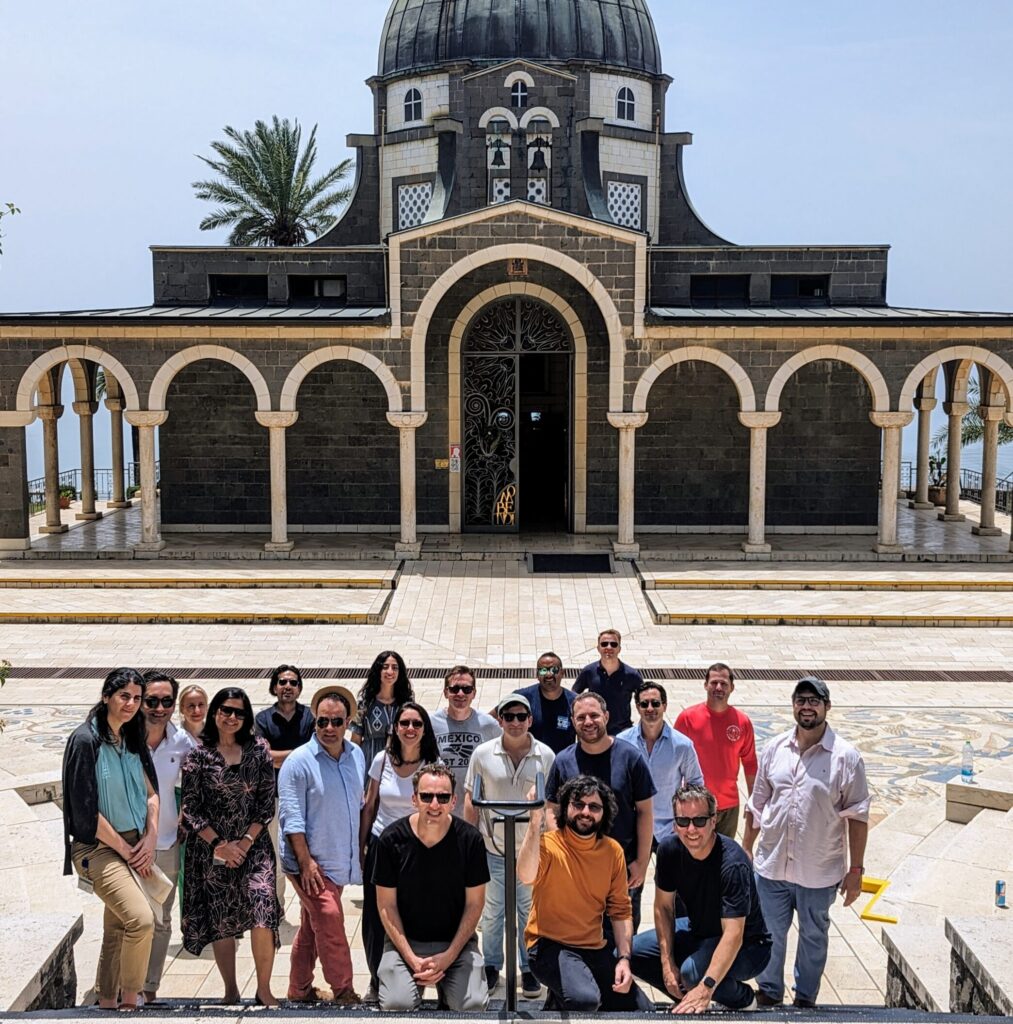
Taiwan 2023
Global leaders cannot sit idly by as the world order faces increasing threats; instead, they will need to be proactive to secure the future.
That was one of many takeaways from the latest group of Millennium fellows to go on their study tour abroad to one of the geopolitical frontlines around the globe, an experience offered as part of their fellowship program. For this tour, the 2023 fellows visited Taiwan to meet with government officials, private sector innovators, and civil society groups to discuss the challenges that leaders contend with today and will continue to contend with in the future. Below are our fellows’ takeaways from the trip—which was supported by the Taipei Economic and Cultural Representative Office—touching upon everything from how leaders should prioritize their countries’ needs to the role of education in building future security.
Jump to a fellow reflection
Tara Hariharan: Don’t forget the vulnerabilities
Chynna Hawes: Leaders need to listen to people facing a variety of challenges
Alyona Nevmerzhytska: What countries with shared values can learn from each other
Nathan Bruschi: China’s perspective on Taiwan shows how deterrence must evolve
Connor James: It may not be all about optics—but the optics have implications
Will LaRivee: Education’s impact on national security
Don’t forget the vulnerabilities
Our cohort engaged in a war game simulation in which we assumed the roles of key countries and international institutions to strategize on how to respond to a de facto blockade of the Taiwan Strait by China. The most exigent risk from the blockade that we needed to address was Taiwan’s dependence on imports for 98 percent of its energy needs. Furthermore, Hsinchu Science Park—an industrial hub devoted to scientific and technological development, which we also visited—singlehandedly consumes 10 percent of Taiwan’s energy. We thus saw how Taiwan’s public and industry would be negatively impacted very early on in the contingency of a blockade, even if the United States were to expediently pressure China to eventually reverse course. Taiwan, like many countries, seeks to increase its renewable energy capacity, but the war game suggested that Taiwan has significant energy-security risks.
At Hsinchu Science Park, we learned about Taiwan’s global leadership in semiconductors and the dominant role this sector plays in the Taiwanese economy. Recently, the founder of semiconductor manufacturer Taiwan Semiconductor Manufacturing Co. expressed concerns that US-China economic tensions and technological competition could have global fallout, eventually slowing global chip production, including in Taiwan. Semiconductor exports contribute a quarter of Taiwan’s gross domestic product, and so any disruptions to domestic chip manufacturing pose grave risks to Taiwan’s current economic model.
More broadly, these two experiences underscored for me how important it is for leaders—of countries, companies, and other organizations nationally and internationally—to preemptively address vulnerabilities. It is often difficult to effectively address challenges after they fully manifest, particularly if they are precipitated by sources outside of one’s control (including geopolitical developments). Instead, leaders should focus on shoring up operational resilience in order to ensure that vulnerabilities don’t give way to crises.
—Tara Hariharan is a 2023 Millennium Leadership fellow and managing director of global macro research and head of research at the New York-based hedge fund NWI Management LP.
Leaders need to listen: People face different challenges from a variety of directions
We arrived in Taiwan as it was gearing up for the January 2024 presidential election, which—like many Taiwanese elections—will be seen as a referendum on the future of US-China-Taiwan relations.
But there are other issues that Taiwanese voters are considering heading into the elections.
From our meetings with people from various parts of Taiwanese society—including people from academia, civil society, and the private sector—we heard repeatedly what the election means for the younger generation of voters. We heard that young voters are dissatisfied with their economic prospects and feel worse off than their parents’ generations as they continue to face a competitive job market, low wages, and high rents. Many young people, increasingly frustrated with the two main political parties, seem poised to vote for the candidate of the newer Taiwan People’s Party, Ko Wen-je, who they view as honest, straightforward, and social media-savvy.
Taiwan is incredibly energy insecure and has high energy demand to fuel the island’s world-leading semiconductor industry. The ruling Democratic Progressive Party is pressing ahead with plans to possibly phase down nuclear power, and much of the public agrees. But the business community, typically a supporter of the Kuomintang party, is concerned about the economic and geopolitical implications.
There are many other issues the Taiwanese people will be thinking about when they head to the polls—immigration, indigenous people’s rights, childcare, eldercare, and healthcare, to name a few. But while economic issues may be the most pressing, China isn’t too far from the minds of voters. Some millennials our cohort spoke with even noted that their choice to not have children is impacted by the geopolitical situation.
The pre-election period was an opportune moment to learn more about what matters to Taiwanese people, and that is clearly a variety of things far beyond geopolitics. Global leaders are challenged to respond to a variety of challenges simultaneously—remembering and being accountable to diverse opinions is an important part of effective decision making.
—Chynna Hawes is a 2023 Millennium Leadership fellow and director for China at Edelman Global Advisory.
What countries with shared values can learn from each other
During the trip, our cohort visited the beaches of the Kinmen Islands, where anti-landing barricades face China’s city of Xiamen. Our local guide was optimistic about the effectiveness of the barricades, saying that they ensure war between Taiwan and China is in the past and never returns. But as a Ukrainian participant living in a brutal, unprovoked full-scale Russian invasion of my country, I would recommend to the Taiwanese people to be prepared. Discussions on disaster planning, self-defense, mutual aid, and medical training are essential preparations for any unforeseen challenges. Being well-prepared is key to being resolute in the face of uncertainty.
The threat feels close on the Kinmen Islands: There’s no need to use binoculars to feel the power and might of Xiamen, only miles away across the water (and much closer than the main Island of Taiwan). Locals on the islands talk about building a bridge and connecting Kinmen with China, which to me immediately had unwelcome similarities to the Crimea bridge that connects the temporarily occupied peninsula with Russia—and now, during the war, serves as a logistics chain to provide weapons and occupy more territories of Ukraine. A bridge between Kinmen and China might endanger Taiwan’s national security. If the situation were to mirror what happened in Crimea, a bridge between Kinmen and China could even potentially pave a path for China’s wider takeover of Taiwan. Such an event, if following what happened in Crimea and the Donbas in 2014, could even unfold without provoking strong reactions from the United States and the democratic world.
Taiwan’s struggle for recognition and sovereignty, which it is undertaking while navigating its complex relationship with China, struck a chord with me as it evoked strong parallels with Ukraine’s own battle for democracy and sovereignty.
For me, a Ukrainian, the study tour in Taiwan was a deeply personal journey. It illuminated parallels between two seemingly distant geopolitical situations and offered valuable insights that resonate profoundly with Ukraine’s own fight for freedom and independence in the face of geopolitical complexities.
—Alyona Nevmerzhytska is a 2023 Millennium Leadership fellow and serves as chief executive officer of hromadske.ua, a Ukrainian independent online news media platform.
Get a glimpse of the study tour
China’s perspective on Taiwan shows how deterrence must evolve
As a military officer working on strategic deterrence operations in the Eastern Pacific, I always viewed China-Taiwan relations through a hard-power lens: a naval scramble for land to solidify territorial control, access to resources, and dominance of shipping lanes. After visiting the Taiwanese Foreign Ministry, I came away seeing the conflict as much more existential. The mere existence of a free Taiwan is existentially threatening to Chinese leader Xi Jinping, because (even though most Taiwanese citizens do not consider themselves Chinese) it shows Chinese citizens the true counterfactual: China need not be authoritarian to be prosperous.
Since the Chinese Communist Party’s (CCP) transition from a revolutionary party to a governing one, it has searched for legitimacy everywhere but the ballot box. Mao Zedong initially tried to base his legitimacy on a class struggle before lurching towards a cult of personality in the Cultural Revolution. Deng Xiaoping emerged from this chaos to use economic development as a sort of social contract: the CCP would lift millions out of poverty, industrialize the nation, and reliably increase the gross domestic product in exchange for the tacit consent of the governed. Xi lurched back towards authoritarianism after a steady trend of societal opening and faced minimal opposition in part due to the economic promise of his “Chinese Dream.”
Taiwan is the reality that challenges that dream. Since the end of martial law in Taiwan, people on the mainland gaze across the strait and see a people that China still considers to be Chinese, but who are able to enjoy both economic success and political liberty, showing that their Faustian bargain with a Hobbesian leviathan was unnecessary. There wasn’t some traditional, cultural, or Confucian reason why they had to trade their liberty for financial security. Taiwan by its existence shows they could have had both.
It is a story we’ve already seen play out in Ukraine as Russian President Vladimir Putin felt intellectually threatened by Ukrainian people he considered to be Russian moving closer to the West. Applying this insight to the world, one can imagine similar intellectual security dilemmas precipitating a new series of conflict less susceptible to traditional deterrence.
—Nathan Bruschi is a 2023 Millennium Leadership fellow and president and chief executive officer of Anchorwork Inc.
It may not be all about optics—but the optics have implications
At the end of the trip, as we stood on the beach on Kinmen Island overlooking China’s Xiamen City just a few miles away, I thought about how the threat of military force in Taiwan not only shows up in everyday life but also plays a role in US-China relations.
A large-scale conflict involving China and Taiwan would have significant human, economic, and geopolitical implications, but simply the credible threat of military force from China has the potential to impact policy. China’s ability to leverage its credible threat of military force in Taiwan—not just for geopolitical power, but for favorable economic and political agreements with the United States—is deeply concerning.
This dynamic is unfolding as the United States faces waning domestic support for US involvement in global conflict. As the most recent example, the US Congress has been split on approving additional defense funding for Ukraine. The optics that the United States may not have resounding support for defending Taiwan (with a recent poll finding that only a narrow majority of Americans support committing US troops if China were to exercise force) could impact China’s calculus in dealing with the United States.
While it may seem like military force is somewhere on the horizon, the impact of the threat of military force is already here in Taiwan—and globally.
Amid increasing geopolitical tensions—not just in Taiwan, but in Europe and the Middle East—this trip reinforced how important it is for leaders to recognize the impact that external perceptions of domestic public opinion can have.
—Connor James is a 2023 Millennium Leadership fellow and a senior director at Laurel Strategies.
Education’s impact on national security
On our second afternoon in Taipei, we visited the Junyi Academy, where we had the pleasure of speaking with Anting Liu, founder of Teach for Taiwan, and Shinjou Fang, chairman of the Chengzhi Education Foundation. These inspiring teachers at the forefront of a movement to improve Taiwan’s schools shared their perspectives on evolving societal priorities and the importance of education in defining national identity.
Before the turn of the millennium, Taiwan’s primary and secondary education system was highly centralized and prioritized Chinese language, culture, and history. Speakers throughout our visit shared their childhood memories of learning more about Chinese mountains and rivers than about those in Taiwan. These standards, they said, changed with the new millennium, when the Ministry of Education reformed its school system, decentralizing curriculums and pivoting toward Taiwanese history and heritage.
Our hosts explained that this focus on young pupils drove a seismic shift in cultural identity. Earlier generations identified more closely with their cross-strait neighbors, claiming shared Chinese-Taiwanese or exclusively Chinese ancestry. Today, when asked, a majority of the population identifies as Taiwanese, with smaller groups claiming sole or part Chinese heritage. These evolving attitudes can be seen in the success of the Democratic People’s Party, whose leaders leverage national identity as the basis for continued self-governance.
Some suggest these cultural changes present a provocation to China, whose leaders claim the right to rule the island. These people would argue that each additional step toward formal Taiwanese independence may increase the odds of Chinese action to gain control of the island, either through influence operations, economic pressure, or violence. During our trip, I saw that, particularly in countries facing geopolitical pressures, teachers play vital roles in cultivating resilience and strength in the minds of young people. For Taiwan, it is clear that these teachers help build the STEM foundation necessary to fuel the country’s ability to innovate. They instill information-literacy skills required to identify misinformation and disinformation, which are key tools used by ill-intentioned Chinese cyber actors. Most importantly, these instructors establish the civic baseline and cultural structure necessary to continue democratic self-governance in the face of direct pressure from an authoritarian neighbor. Their work proves invaluable in shaping future generations and strengthening a sense of cultural and national identity.
—Major Will LaRivee is a 2023 Millennium Leadership fellow and an F-22 instructor pilot in the US Air Force.
Guatemala 2023
By Jonah Fisher, Natalia Etten, and Taylor Smith
In March 2023, the 2022 Atlantic Council Millennium fellows embarked on an eight-day study tour to Guatemala to explore four key issues: diversity, economy, environment, and migration.
Twenty-four Millennium fellows from all over the world—who represented government, civil society, academia, and the private sector—held meetings with Guatemalan politicians and officials (including the president, foreign minister, Guatemalan City mayor, and several ambassadors) to get a glimpse of the country’s politics and diplomacy. They also met with activists from civil society and business leaders to better understand how global communities are fighting to preserve their cultures.
The Millennium Leadership Program aims to build a community of next-generation leaders who are connected to each other and to local partners in the region; it also aims to help these leaders understand Guatemala’s challenges and possible ways to tackle them. The program also hopes that these leaders will take lessons away from this experience and apply them to their own contexts, in countries facing crises and challenges.
Here are the lessons and experiences that the 2022 Millennium fellows walked away with.
The one-on-one conversations with the fellows are the highlight of the trip for me. Each fellow has so much insight and knowledge to share. The connections I made are strong and I expect to maintain them long after the fellowship has ended. —Sean Gonderman
Starting with a leadership retreat in the mountains of Antigua, fellows participated in two days of workshops with a team of leadership trainers from Spencer Stuart. Through a variety of team-building and leadership exercises, fellows gained a deeper understanding of themselves, each other, and the group.
In between leadership sessions, fellows were immersed in the rich history and culture of Guatemala in sessions led by Ronald Flores, director of Michael Polanyi College at Universidad Francisco Maroquin. These experiences quickly fostered camaraderie among the fellows.
Even beyond the programming, fellows made connections that will last long into the future. On bus trips between meetings, fellows chatted together on topics from corporate social responsibility and global energy markets to the real Uno rules. These bonds pass the test of time and help the fellows form a deeply intertwined network; for example, 2018 fellows Rebecca Jones and Welton Chang—who had traveled to Turkey and Greece—eventually joined together to start their own company.
It was great to learn the human side of the successful people in the cohort, from travel stories to advice on driving and relationships. Each and every conversation is the story of success that we don’t see—the resilience. —Jamechia Hoyle
The trip included a visit to Guatemala City, where the fellows met with leaders in government and civil society to learn more about the politics impacting the country.
The fellows gleaned that Guatemala faces an array of challenges in promoting transparency and political awareness. It became clear that civil society actors play an important role in holding government institutions accountable.
The fellows met with then Guatemalan President Alejandro Giammattei, who outlined his hopes for Guatemala. Minister of Foreign Affairs Mario Búcaro followed this with his thoughts on Guatemala’s role in Central America and the world.
The president and foreign minister also discussed Guatemala’s response to COVID-19, its support for Ukraine, and its environmental and climate policies. Fellows not only sought to learn more about the political situation in Guatemala; they also connected what they were learning to their own work as change makers and to the political context back in their home countries.
The group of humans who make up MLP is unbelievably inspiring, and I will take with me their mission-orientedness, optimism, and drive for change in my work and life. —Amanda Edelman
The fellows left the city to traverse the Maya Biosphere Reserve and learn more about the civilizations that once lived there. Under the guidance of Marianne Hernandez, director of the Foundation for Maya Cultural and Natural Heritage (Pacunam), and Eduardo Bustamante, a local archaeologist, fellows explored the ruins in Petén and learned about the Maya history and culture.
In addition to learning about the ancient civilizations in Petén, the fellows were reminded of the people still living there, many of whom are facing significant challenges in sustaining their communities. Although the ancient Maya city Tikal receives over two hundred thousand visitors a year, fewer visit Uaxactun—a city where Maya sites and a modern community coexist. The fellows traveled to this city, meeting the people who lived there and visiting the Uaxactun Organización de Manejo y Conservación to learn about their efforts to protect the Maya Biosphere Reserve.
The fellows walked away with a sense of how important it is to protect diverse communities. During his introduction of the Yaxha site, Fellow Ramadane Hagne reflected that while these communities and others like them face such overwhelming challenges, the preserved temples and the incredible knowledge that has persisted for over two thousand years in Guatemala are proof of humanity’s resilience.
It takes a village. Leadership must be a team or group journey. We need peers, we need friends, we need people to keep us in check, help us grow, and be kind enough to push us where we need to get. It is not an individual journey as we have been taught to believe. —Luis Alvarado
One of the key takeaways for the fellows was the importance of listening to and learning from local communities. It was argued on the trip that efforts at sustainable development are often led by outsiders who may not fully understand the nuances and complexities of those directly impacted by the issue. But working in partnership with these communities and supporting their autonomy and self-determination can help to ensure that cultures are preserved for future generations.
As part of the trip, the fellows met with Maria Pacheco, founder of Wakami, a business that provides a sustainable marketplace for local women to make jewelry. Through Wakami, women have a source of income to support themselves and their families. At the meeting, women who partner with Wakami talked about the impact the business has had on their lives and the lives of their children. The consistent income, as well as education on health and other topics, helps women secure their independence and foster intergenerational stability.
It was remarkable to watch a group of twenty-four strangers transform into a tight-knit, inclusive, and engaged community. I am immensely moved by this experience; it was unlike anything I have ever done before. —Melissa Saphier
The fellows also spoke with Progreso, a company in construction materials that works across Latin America. Progreso Chief Executive Officer José Raúl González Merlo, Board Chairman Thomas Dougherty, and their team gave a tour of their cement factory while outlining Progreso’s efforts to invest in local communities.
The fellows also visited Finca el Pilar, a cooperative community of businesses that Progreso supports. At the co-op, the businesses sold everything from flowers to coffee and from wine to Pepián, a Guatemalan meat stew. The fellows were immersed in this culture of collaboration and entrepreneurism.
These experiences highlighted the important role that nongovernmental organizations can play in supporting continuous development and social progress in the countries where they operate.
The twenty-four Millennium fellows returned to their home countries with new networks and tools, and a deeper understanding of Guatemala and Central America, strengthening their capacity as next-generation global leaders.
This study tour was executed in partnership with 2022 Millennium Fellow Jose Echeverría (executive president of Movimiento Cívico Nacional), his team, and the Atlantic Council’s Adrienne Arsht Latin America Center. Movimiento Cívico Nacional was pivotal in the planning and execution, providing invaluable knowledge on local contexts, culture, and language.
Get a glimpse of the study tour
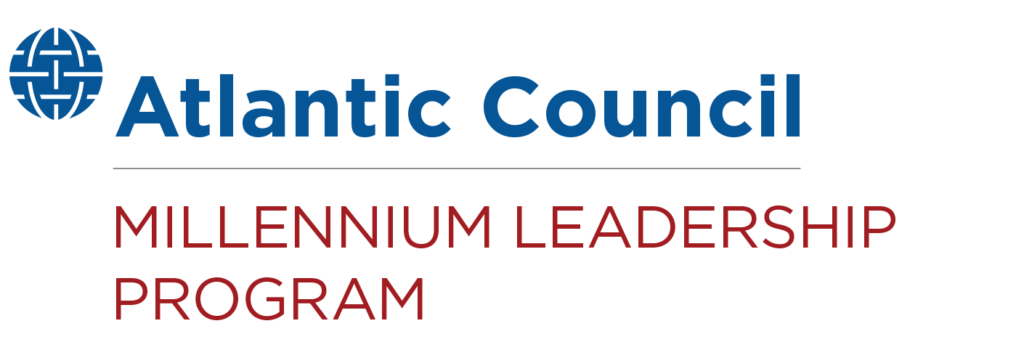
The Millennium Leadership Program aims to foster, connect, and empower the next generation of global leaders.
